#though i do think their traumas and emotional problems effect their relationships in a realistic way
Explore tagged Tumblr posts
Text
Many of us saw the Raimi trilogy as kids and so the main characters were just put in the mental category of "adults," but growing up and realizing Peter, Harry and MJ were all in their late teens/early 20s gives their behavior a lot of much needed context, actually.
Oh, they're indecisive and riddled with insecurity? Their love lives are a complete mess? They think one mistake or setback means their life is over? Well, no wonder! They haven't even beat the 25 allegations yet.
#all three of them feel like a disappointment to their father and that doesn't help#they should have been BONDING over that not fighting!#though i do think their traumas and emotional problems effect their relationships in a realistic way#even MJ#ESPECIALLY MJ#yeah she had commitment issues she had not been shown a healthy model of love#raimiverse#raimi trilogy#spider-man#mary jane watson#harry osborn#peter parker#op
136 notes
·
View notes
Note
I'm sure you've been asked this a number of times within the last 3 days, but what did you think of the Amphibia finale? Now I wanna make it clear that I'm a safe environment. Anything you wished you could've seen or changed pls don't hold back I'm all ears ;)
!! first off, thank you for asking I have been dying to talk about it. and second off- (i'm putting this under a read more because it is a LOT)
I thought it was great!!! the only issues i had were with how things were.. addressed, or rather were not addressed (it's more of a problem with Amphibia overall than it is a problem with the finale- as i said before, amphibia is great at realistic character relationships, but not so much with the consequences of what happens to those characters) and I will admit, i am a bit upset about the fact that Anne had to leave the Plantars behind forever.
They were the entire catalyst for her change- they showed her how to have responsibility, and what healthy friendship is like, and challenged the morals instilled in her by her previous enviroments so that she could become a better person. And they were a family! a literal family! i get that the show is about change, but I still find it hard to accept that she just.. had to leave them behind. They were such an integral part of her life and delvelopment... at the very least, if they couldn't have met in person, i wish they could have had a wifi signal in amphibia, or opened the portal enough to chat once in a while. The fact that Anne became a herpetologist in their hoonor is such a beautiful fact though oh my god-
And as for the not addressed part, true colors was one of the most impactful and somehow least impactful episodes of the entire show. Marcy died, which lead to her becoming possessed, and Sasha creating a rebellion to save her, but nothing about her dying was ever really... discussed. Like yes, Anne was head deep in denial, but none of the other effects of her absence (her parents, etc) were ever brought up, or shown. Not to mention the lingering physical aftereffects of all of that... rejuvination tank or not, it's entirely possible Marcy has some health issues from being literally impaled, but it was like nothing ever happened, much like the gash down sasha's back. As for Anne, i kind of wish we got more of how she's doing in the future- she has all this knowledge on her shoulders, and all this trauma, and it would have been interesting to see how she's holding up after 10 years with the fact that yes, she is going to die at 91 and become god and whatnot.
but oh my god. the sequences?? anne's death?? the goodbyes, the whole of it?? it was absolutely AMAZING. i loved thier final calamity forms, and the sheer emotion of Anne's death- the fact that she was so ready and had no regrets except for love choice two absolutely breaks me. all she wanted was for them to be safe. oh my lord.
In addition, I liked the little flash forward into how Spirg and Polly are doing! thier outfits and designs are so cute, and it's both heart breaking and inspiring to see how Anne is such a big influence for Sprig even after all this time... man. Also they discovered a new continent?? wtf??? huh???
I'll be thinking about the trio as adults forever lol- honestly it surprised me the most that Sasha became a therapist- who knew she would go from "i'm just kidding mar-mar, i don't actually care" to "and how does that make you feel?" I loved that Marcy became a webcomic artist- she's always been valued for her intelligence in the show, so much that people often overlook who she is as a person sometimes (take O&Y for example, where it wasn't "we need to save marcy bc she's trapped in a horrible situation" it was "we need to save marcy because she's the only one who can defeat the king") and so good for her honestly!! hell yeah, unleash that creativity!!!
AND ANNE BEING A HERPETOLOGIST... never gonna get over that either! she named the little guy sprig!! sprig!!!!! and made an entire little wartwood for him!!!!! everything about the finale is so bittersweet, but I'm glad that Anne found her calling in a way that still managed to connect her to amphibia even though she can never go back... when she becomes god, i hope she gets to meet Sprig again.
20 notes
·
View notes
Text
Renga Shouldn’t Be Canon (clickbait)
No but seriously, I hope that Renga doesn’t become canon, at least not in the way that I think a lot of people are hoping that it will. Personally, I’m not expecting anything close to a kiss and confession and that’s fine by me.
Queerbaiting is a problem in mainstream media, there’s no doubt about it, and many people both within and outside the queer community are right to feel wary about hoping for that kind of representation. Personally, I’m still caught by surprise every time a queer person or couple is depicted in a normalized and healthy way onscreen. And that just speaks to the appallingly poor representation queer people are so used to seeing.
But I think that fandom likes to throw the word “queerbaiting” around a bit haphazardly, much in the same way faux woke people throw around words like “gaslighting” and “cancel culture”. They’ve become buzz words to evoke immediate feelings of self-righteousness and to prey on person’s fear of appearing ignorant or bigoted.
Unfortunately, I worry that when the season inevitably ends without Renga’s “canonization”, people will unfairly label Sk8 as Queerbait. And I have many Feelings about this- mostly frustration.
But we’re only mid-season. I can only guess where the show is going to go and only make assumptions about fandom behavior based on personal experience, and there’s a high possibility I’ll be proven totally wrong so... take whatever I say with a grain of salt. But anyway, let’s get on with it.
Fundamentally, Sk8 isn’t shoujo, it’s not BL- it’s a sports anime. And while that doesn’t preclude a total absence of romance between its characters, ultimately those aren’t the kinds of relationships that sports anime concerns itself with. The most prominent relationships you’ll see will be more along the lines of Teammates and Rivals (there's also a third dynamic I'm calling Opponents which is Not the same as Rivals but the Opponents dynamic is less relevant to my point so I'll focus on just the first two).
However, it's not hard to see why romantic interpretations are so common among fans of sports anime. At their core, the basis of Teammate and Rival dynamics bear many similarities to that of a compelling romance. Both Teammate and Rival relationships are built upon two characters' mutual admiration and respect for one another, they involve characters learning from one another and being inspired to push themselves to be their best. There's a great deal of trust involved, as is vulnerability, communication, and empathy. In other words, all the essentials of any healthy relationship.
But context and genre are important. I think that a good romance is one that is unique to its characters specific personalities and needs, as well as is believable within the context of the setting and story. For an anime like Sk8, I would find an on-screen kiss strange and out of place (unless it was done for comedic effect which would be... bad).
I'm reminded of this quote from Portrait of a Lady on Fire, which is one of my all time favorite films:
"Do all lovers feel as though they are inventing something? I know the gestures. I imagined them all waiting for you."
And that basically sums up what I've described, albeit more poetically. Love is invention. Romantic gestures form a unique language between lovers. And if I may add, genre and narrative establish the basis for the emotional significance of these gestures.
In a genre like action/thriller, one of the most meaningful things a character can do is risk their safety or straight up sacrifice themselves for another, because bodily harm and physical risks drive the tension in these kinds of narratives. In the romance genre, confessions, physical intimacy, and grand romantic displays serve the same purpose. In something like sports anime, I argue that its gestures like physically accommodating for your teammate, supporting them when they feel dejected, and being motivated to train harder and be better for the sake of being allowed to stand beside them, that hold equivalent significance.
But this is all broadly speaking, and genre is just one element. Characters’ personalities, habits, insecurities, and trauma, as well as a story’s themes, further specify the kinds of gestures that hold the most meaning in a narrative.
Let’s look again at Portrait of a Lady on Fire, on my favorite scenes:

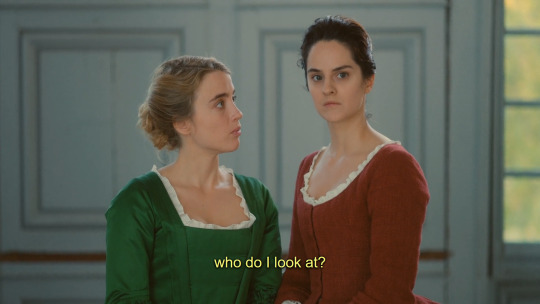

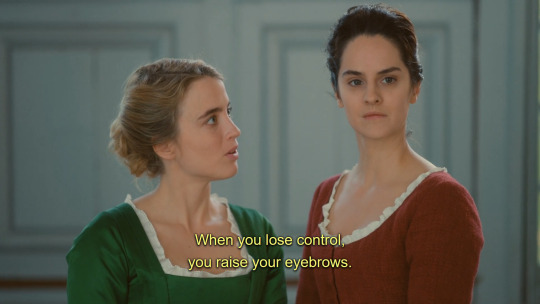
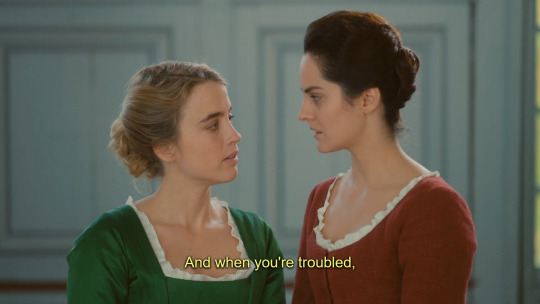
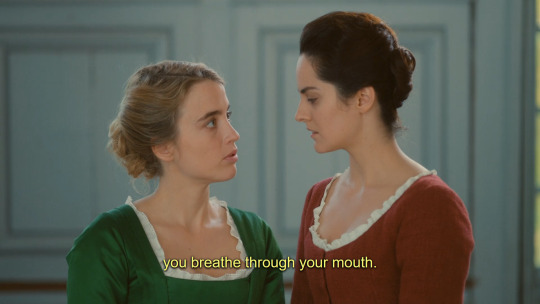


Portrait is interested in subverting the power imbalance inherent between the Artist and the Muse, the Voyeur and the Subject, the Looker and she who is Looked At. Heloise’s observations of Marianne hold great significance because of this theme; she disrupts the power imbalance by taking back agency as the Subject, demonstrating that she is just as capable of Looking at the Artist just as the Artist does at her. This is visually represented by the framing of the final shot. With the camera pulled back, we now see Marianne as Heloise has been seeing her, and she is now subject to being visually scrutinized in the same way that Heloise has been up to this point in the film.
This scene is so poignant because the romantic gesture it depicts ties heavily to the story’s themes, its characters’ personalities, and its existence is believable within its genre.
Now, let’s bring this all back to Sk8. In this show, what sort of gestures are given the most significance?
Skateboarding. Duh.
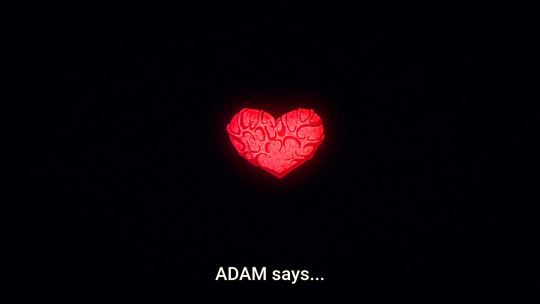
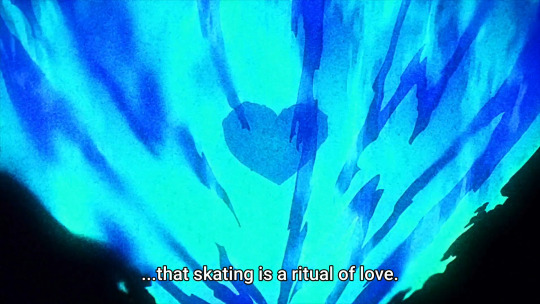
Basically, this line establishes that “basis for emotional significance” that I mentioned earlier, such that skating is the means by which characters and relationships are developed and the plot is driven forward, that any and everything related to skating potentially holds symbolic meaning.
And specifically, equating the act of skating to love then allows for more romantic interpretations of all kinds of scenes. Take for example, these parallel sets of shots from ep 1:
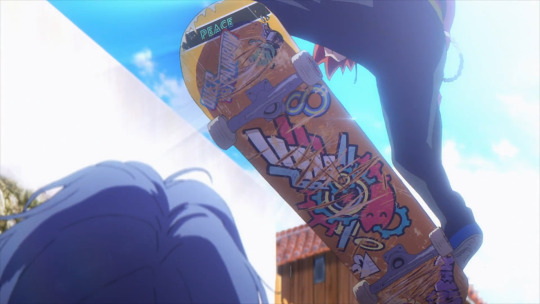
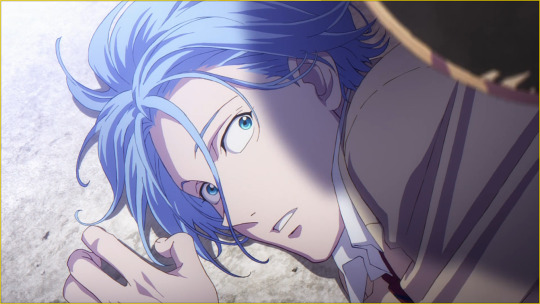
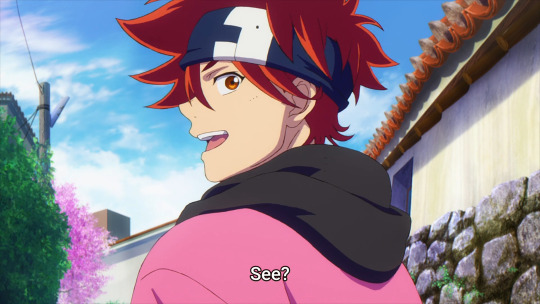

(I mean cmon look at his tiny blush, it’s fucking adorable) And:
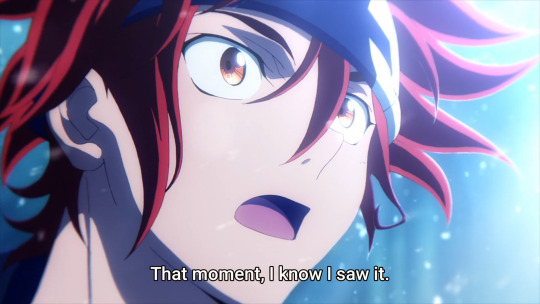

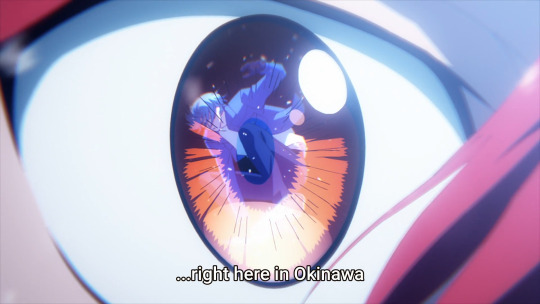
In a show that equates skating to a “ritual of love”, these scenes can be realistically be interpreted as Langa and Reki falling in love with one another. Skating acts as both the catalyst for their relationship as well as later on being the means by which they express their feelings and develop their relationship.
Skating is their love language.
Ok, I’ll try to wrap this up since this post has gotten wayyy too long. But basically my point is that Renga is about as canon as this show could possibly make it within the confines of its genre and narrative. Romance in sports anime is different from romance in shoujo, but it’s romance all the same, in the same way that different people express love in different ways.
A kiss and confession is not the only means by which a ship can become canon. And I personally would much rather have this kind of carefully crafted symbolism than a kiss just randomly shoehorned in.
But I understand that in the face of centuries of censorship, cop-outs, and barely believable and forced heteronormativity, people want same-sex intimacy onscreen, unapologetic and normalized. I get that.
But in my opinion, Sk8 isn’t queerbait, and it shouldn’t be accused as such just because its characters won’t kiss onscreen. I think this show depicts a wonderful and loving relationship between two boys, that isn’t any less loving just because it doesn’t fit into conventional romantic tropes.
Edit: I did a followup post about Sk8 and its queer representation here, where I go more in depth into the ways that Sk8 represents queerness through beyond its implied homo-romantic relationships.
So yeah, I’d love to hear yalls thoughts :)
#this is gonna get me cancelled#i kno it to be true#but Some Bitches like to reduce romance to kissing and sex#which is the smoothest fucking brain take i have EVER heard#gay ppl invented romance#Good Romance#i don't make the rules#sk8#sk8 the infinity#sk8 meta#renga kyan#langa hasegawa#renga
312 notes
·
View notes
Text
Post Grondor Field AM Analysis
I'm prefacing this by saying that I'm still not sure I can write a good analysis of this scene for two reasons:
1. I don't know what comes after, and
2. I'm very emotionally involved in what happened.
But I tried my best. One thing is for sure though, what happened in Grondor in AM was an incredibly significant turning point for AM and Dimitri and my thoughts and analysis on it will definitely expand as I keep writing about and playing the game.
Part of me is just so happy I got to see Dimitri's supports, have the inevitable turn around, and get to do things like tea and dinner time again that it's hard to be objective about this scene.
And by "this scene," I don't mean that actual fight at Grondor, but everything from Fleche's attack to Byleth's words in the rain later.
It wasn't all about Byleth . . .
Given how poignant Dimitri's character arc has been so far, I had a deep rooted fear player-pandering would ruin it. Byleth, as a concept, isn't bad, but too often the heaps of praise feel underserved and other things (like Claude's intelligence, Edelgard's relationships with everyone else) get ignored to make more room for player-pandering.
Thankfully this did not happen. Byleth, throughout the early chapters of AM's part 2, failed to reach Dimitri. And, honestly, seeing Byleth actually struggle for once has done wonders for how I view her character. Still, I worried that player-pandering-power, rather than something that felt earned, would cause the inevitable eye-opener for Dimitri.
But it wasn't just Byleth. Fleche's vengeance kicked everything off, what veered Dimitri away from his fate in other routes. He accepted his death at her hands, not bothering to defend himself. Rodrigue stepping in the way and his parting words forced Dimitri to confront things he'd ignored. Throughout AM so far, people have posed questions to Dimitri who refused to answer them because he didn't want to face what they asked. But Rodrigue dying for him, spending his final words telling Dimitri to live for himself - combined with Fleche's attack - forced Dimitri to confront things he avoided. It wasn't until after all of that when Byleth steps in.
And Byleth didn't "fix" him either. Dimitri's supports show a young man who's still very much struggling with his mental health, poor self-image, his previous actions, and wondering if he deserves not only to live for himself - but if he even deserves to live. Byleth didn't hand-wave Dimitri's problems away.
Everything about the scene is stronger because it didn't fall back on player-pandering, but more earned, realistic, and dramatic actions and consequences - including Byleth's involvement which felt far more earned than usual because of prior failure.
But I wish Dimitri's friends played a bigger role.
Not everything was perfect though. I wish we got a little more than we did from Dimitri's house mates - especially his childhood friends Sylvain, Ingrid, and extra special mention to Felix and especially, especially Dedue.
Throughout all of AM, none of the above mentioned characters feel utilized to their full potential. This isn't a problem exclusive to AM, and by all means it's far from the biggest offender, but given how close all the ties are in AM, it's felt when it's not there.
I still don't know what exactly I would've done with them. Maybe I'd need to make the game an actual novel to do it, and you can't forget how perma-death has historically held back games at times, limiting major moments to a select few "retreat" candidates.
Still, though, getting a bit more from Ingrid, Sylvain, Felix, and Dedue would've made the scene even more powerful.
I actually really liked the scene in the rain.
I haven't made it a secret that I dislike Byleth. Or maybe disliked is more accurate. Lately I've been rethinking my stance on Byleth, in part because I've heard from people who like her or found ways to make her work and from my own thinking about the game while planning future write ups.
I don't think it's Byleth I really dislike, but the player-pandering. Separating the two isn't easy, but it's easier since I've starting coming around to seeing Byleth as her own character.
There's been a few moments that made me care for Byleth, and this scene in the rain was one of them. Because she didn't just fix everything. She tried and failed for months to reason with Dimitri, and despite everything she never gave up on him or failed to keep offering her hand.
I'm not going to lie. I got all the bubbly, heartwarming, heartbreaking feels the writers wanted me to in this scene. Seeing Byleth reach for something and fail, and then finally, finally get through was rewarding in a way many of Byleth's prior accomplishments aren't because this one felt earned. And by God did she earn it.
Some people will likely disagree with that last point, but I disagree with them. She asked Dimitri hard-hitting questions, forcing him to come to unpleasant conclusions rather than trying to force him into anything. She kept Dimitri from veering to far off course, even at expense to herself when she killed Randolph. She saved Dimitri from Fleche when he refused to save himself. She quietly supported him, coaxing out the good she knew was still there and refused to give up on.
I'd never in a million years say someone in real life should put up with Dimitri's toxic behavior and verbal abuse, even considering his extreme trauma and aggravated mental illness. But seeing someone fuck up so badly still get forgiven, still get supported, still struggle but honestly change for the good, still get loved, start to accept and forgive himself through the power of love and forgiveness from others is very powerful, especially since media so often downplays those "softer" things as weakness in comparison to the "badassery" of ambition and stoicism. Using Byleth, who previously had little experience with feelings, who was encouraged to experience them in healthy ways by Dimitri, return the favor isn't really the worst choice.
It's cliche, but cliches aren't always bad.
The mentor dies. Redemption in the rain. Revenge against the protagonist's actions opens their eyes. Etc . . . This scene was chuck full of cliches, but that's not necessarily a bad thing.
Tropes serve an important narrative purpose because a writer can rely on them to convey a message to the audience that either saves time or sets them up for something unexpected or even expected. Fire Emblem has always and will always be incredibly cliche and full of tropes. It loves tropes so much there's in-universe ones that make some unit or character discussions sound like a foreign language to people outside of or new to the fandom, talking about "Ests" and calling someone a "Camus."
What matters is if a story pulled something off well, not if it's terribly unique. A mentor dying is powerful because it forces the student to grow. Redemption in the rain is high symbolic of water washing things away + the somber atmosphere rain creates. Someone trying to get revenge against a character provides an eye-opening experience about the ripple effect of their actions. We see these things in fiction all the time because they work.
All the tropes worked like expected in this scene. Using images instead of cut scenes did make less of an impact, but more on that later.
Tl;dr: There's nothing unexpected or terribly unique about what happened. It was honestly painfully predictable, but that doesn't make it bad and is in a series that does this all of the time.
The voice acting carried because those images can't.
A major downside to this scene is that it used vague images instead of a cut scene. I get that budget and time were likely concerns, but many cut scenes from earlier in the game seem rather trivial. Did we really need that dance one? Really? I don't think so.
This was a hugely important, action heavy moment. Using one or two still images to convey everything that's happening and all those emotions, really makes it less than it could've been.
That said, the voice acting saves it. I've raved about how amazing Chris Hackeny is as Dimitri, so nothing new here. Rodrigue's and Fleche's VAs also did a fantastic job. No one oversold or undersold the emotions. Even without the cut scene, you felt what happened thanks to the skill of the actors. This scene would've been so much harder to engage with without them, if this was an older FE game where all you got was text. This is 100% one of the moments highly elevated by the decision to have a fully voiced game and choosing high caliber talent (let's not talk about Radiant Dawn's voice acting).
Questionable support timing.
One issue I had came right after the scene when I viewed Dimitri's supports. The nature of some - like his with Raphael and Alois - didn't quite line up with the character I saw in dialogue right after. I wish they staggered them a bit more or got picker about what you could get in part 1 or 2.
This isn't limited to Dimitri either. In the same support batch, I also got a Marianne B support where she still had no confidence or self-worth. And then like 10 minutes later I talk to her in the monastery and she mentions about how seeing all the death in Grondor made her value her life even more.
In the past, I've also received entirely valid opinions that Dorothea in part 2 is hard to understand because she's cherry and flirty in her supports, and morose and hates the war in her monastery stuff, making her seem inconsistent.
It's a bit jarring. It's not really an issue for characters who don't change much like Edelgard or Raphael, but even for characters with more subtle differences than Dimitri, Marianne, and Dorothea - like, say, Lorenz - you get a lot of weird stuff because of supports. I just think Dimitri's stands out because he's a main character with a really prominent, important turning point for his growth.
86 notes
·
View notes
Text
Slender bros rewritten by me
Cause I want character development
(This is mostly Offender, trender, and Splendor. Also if you like Slendey/slender dad you might not wanna read this cause I do not make him a good guy in the slightest)
Possible tw for mention sexual assault, pedolophilia, necrophilia, and zoophilia!
To start off, Offender is not a rapist, he isn’t a pedo, and he doesn’t fuck animals
He doesn’t do anything without consent, plain and simple. Him being all those things was a rumor started by someone he fucked in the past who got caught cheating. They said Offender forced them and the rumors have escalated since with his legend.
He actively avoids children cause he doesn’t like them. So he literally couldn’t be a pedo.
He doesn’t hate kids, he just prefers to not be around them.
He won’t fuck someone with kids unless the kids are out of the house and somewhere safe.
He’s wary about fucking 18 and 19 year olds and usually doesn’t
Occasionally if he sees a kid sad while he’s on a walk or whatever he’ll give them some daisies or something. Though they kinda just appear near the kid. He doesn’t actually go near them.
Though he will fuck old people. He has no problem with that. But he will go gentler cause they’re frail
He likes animals, but not like that. Like.. ew
He has a kind of respect for the dead, even people he’s killed to eat, so he’d never do that. Also it goes back to the consent thing. They can’t consent so he ain’t gonna fuck them.
He’s pansexual.
He’s very kinky, obviously. He’s willing to do pretty much anything in bed
He prefers to top but he has no problem being pegged-
Has tried every drug there is.
Usually just sticks to weed, alcohol, crack, shrooms, and the occasional LSD
Bath salts fucked him up majorly and he will never do them again.
He works for trender, who has a whole ass company (will be touched on later)
He helps trender make clothes for more alt styles (punk, grunge, goth, emo, all that good stuff) and he helps with lingerie (masc and fem. trender makes both. Offender tests it out and gives feedback on what could be added or changed)
He also finds models for Trender (there’s really no qualifications to be a model, you kinda just have to want to be one. Trender, his assistants, and other models will help fill new models in. And they never have to wear something they don’t want or pose a way that makes them uncomfortable. also theres do discrimination when it comes to models, any one of any race, body type, gender (or lack there of), sexuality, and age to an extent (depending on the clothes being modeled and (if parent permission is needed if they get it)) are welcome)
He also does side jobs like art (he does realistic art) plays piano or violin for songs, every so often he’ll join a strip club. Definitely has an OF.
He learned piano from his dad. Their dad made them all learn piano. His dad was very against him learning violin but his mother let him learn it (she knew how to play)
Their parents kept them pretty reserved from the rest of the world (particularly humans) for safety reasons. The brothers didn’t find out they were the only ones of their kind till they were like teens and went hunting for the first time.
Their parents suddenly disappeared when they were teens. They still haven’t found them and have no idea what happened to them.
Zalgo killed them cause the dad was constantly fighting him, so was the mom but less so.
There were originally 5 brothers, but one got murdered (It was Tenderman. Who wouldve been the oldest, then slender, offender and trender are twins, then splendor)
They don’t know how tender was murdered. All they know is they can be murdered. They still haven’t figured out how tho.
They do know that they can regenerate any part of their body (teeth and nails grow back almost instantly, limbs take longer, they can just put their head where it should be and the bone, muscle, skin, tissue and all that will pull back together, skin can either regenerate in about an hour or two or a couple days depending on the size of the wound. Their organs can regenerate but it takes like a month.)
Drugs don’t effect them the same way they do us. Our massive hangovers that put us out of commission is what happens after they do LSD. A regular hangover for us is what happens when they do coke or a drink shit ton of alcohol.
Offender has the highest tolerance, then it’s trender, splendor, and Slender has the lowest cause he hasn’t done drugs.
Splendor has tried them but doesn’t like doing them. He doesn’t drink much either.
Trender will do them every so often, usually with Offender. He either drinks or smokes a blunt usually. Shrooms are for special occasions, and LSD gives him major anxiety so he doesn’t do it.
Trender and Offender were the only ones to try bath salts. They don’t know what happened. Splendor says they disappeared for a month and murdered a shit ton of people. They almost got caught. And at some point Offender ate a whole ass headstone and took a chunk out of a mausoleum
Slender hunts whenever the hell he wants, he doesn’t care about being caught
Offender hunts every couple of months or so
Trender hunts about 2 times a year. He spreads out his food pretty evenly
Splendor hates hunting and usually Offender or Trender will do it for them. They’ll maybe hunt once a year.
Human food to them is like sweets to us. They can’t live off it but it’ll keep them from starving. If they don’t eat human for about 3-4 years they’ll start to starve, but the process is slow and would probably take a while to actually kill them
Trender, Splendor, and Offender try not to get caught or make suspicions rise. They just wanna live their lives.
The amount of people they consume and how long they stay in their human form determines their power levels.
Slender is the most powerful, then Splendor, Offender, and Trender is the least powerful (but they’re all still mega powerful)
Slender is never in his human form and consumes humans whenever he wants so he has nothing holding back his power
Splendor may not eat human much but they’re rarely ever in his human form. And if they are it’s not for more than an hour usually
Offender is in his human form about 50% of the time. He’s in his normal form at home or hunting and any other time he’s human so-
Trender is in his human form like 90% of the time since he spends most of his time at work (he’s a workaholic to the highest extent. When it becomes really bad is when Offender will step in and be like “hey let’s grab a drink and chill out”)
Offender and Slender’s relationship is like Raph and Leo’s from tmnt if their relationship was genuine hatred and violent
Splendor tries to med their relationship and makes times where they all hang out and have dinner together but to no avail
This is the only time Slender can be seen in his human form. He doesn’t want to go but for some reason he does
Slender is stuck in his ways
Their dad hated humans with a passion, and Slender looked up to their father and wanted to be exactly like him so the hatred rubbed off
Slender blames humans for his parents disappearing and Tender’s death. Tender was the brother he bonded with the most
Splendor used to be a really emotional kid and their father hated that so now they bottle up everything
Their mother tried to help as best she could
V support
Trender’s company is a fashion company that produces just about everything
And the sizes go up to 4 or 5 x
And the prices are reasonable and don’t go up with the size
Trender really doesn’t give to shits about money. If he could he’d just give everything he makes away but unfortunately he needs some money to produce what he makes.
He makes kids clothing, teens clothing, adults clothing in every aesthetic you can think of. Rarely will you see basic shit from him
He makes jewelry (real and fake (for the kiddies) and specifies very obviously which is which so someone doesn’t accidentally buy the wrong one)
He makes shoes!
His prices are usually around 10-25 dollars for clothing, sometimes 30 if it’s a specific brand (like Gorillaz or something. He doesn’t work with brands like Victoria secret, brands that have sweat shops, things like that. He doesn’t support them whatsoever)
His business is huge but he always listens to the people and tries to improve. And all his products are made ethically. He tries in every way possible to produce good products without polluting the earth more
Splendor usually only hangs around babies-young adults. They help them through rough home lives, trauma, and helps them find joy. They do everything they can to make them feel better
Splendor is the one who takes care of Sally. And they feels incredibly guilty for not being able to stop what happened to her, or punish her uncle himself.
Animals and mystical creatures are drawn to them and their home. They go to it for shelter and safety, as well as some food. But because Splendor isn’t always there they have a nymph friend there to look after everything.
Slenderman is the only one with proxies
Splendor is demisexual and bi, leaning towards men
Trender is queer and demisexual/demiromantic
Slender doesn’t love anything. Ever.
Trender gets annoyed easily but rarely ever gets pissed pissed (like original face altering pissed) if he does it’s either cause someone did something to his brothers or his models. And the unfortunate soul who did such will never be seen again afterwards
Offender doesn’t really get pissed pissed cause he usually either bottles it up or makes a joke out of it. It’s really only if something happens to his brothers that he gets pissed pissed.
Splendor has a list of people they wish they could rip to shreds. All of them parents. But they don’t want to do that to the children. They only intervenes and gets pissed pissed when the abuse gets physical or sexual. When it’s physically they’ll give the parent one change to never do that again. They’ll scare the shit outta them but won’t hurt them. If it’s sexual they kill them. Plain and simple.
Splendor started wearing pokadots to make the kids happy. Trender hates the suit but doesn’t comment usually
Splendor’s black hands are a skin disease their species can have. The skin is black and kinda ridged.
Splendor wears gloves because of their skin disease. the blood stains and they can’t get it out. Also they’re very insecure about their disease
Splendor put the bells on their tendrils so their movements didn’t scare the kids. They would always know when he was moving and where he was moving to so they’d be more comfortable. It was painful but it was worth it
Slender was in the woods when he was younger and almost got attacked by humans, but his mother came and saved him. (Her tendrils could be used as a shield)
Eden is not related to the brothers.
But eden looks a lot like their mother, so much so that Spendor legitimately mistakes her for their mother.
Slender’s human name is John (splendor had to come up with it on the spot leave them be)
Offender’s human name is Dimitri and I’ll die on this hill
Splendor’s human name is Faer
Trender’s human name is Quael
They can change their physical appearance to be fem or masc. like their body can change.
Slender doesn’t give two shits about pronouns
Offender doesn’t care but he/they/xem works
Trender goes by he/him
Splendor goes by they/them
(Im including Slenderwoman now so uh... 🤷)
Her hair is her tendrils.
She’s not part of the Slender bro family nor does she know they exist (though eventually she will. She’s way younger than them so)
✨Lesbian✨
Has met Slenderman tho. She hates him
Like genuinely hates his guts
She hates almost sharing a name with him.
Prefers to go by her human name; Eden
As long as you don’t use the pronouns he/him she doesn’t care.
She just kinda... appeared at the ripe age of 4? (She doesn’t remember anything past 4 so that’s what if feels like to her.)
Splendor is a switch and you can’t change my mind
Trender is also a switch
Slender doesn’t get any cause he’d kill them, purposely or not, being radioactive and all.
Eden is a top but can bottom is convinced
Offender, Splendor, Trender, and Eden can all control their radiation output so they can glitch tech when they chose and won’t hurt anyone
Slender could but doesn’t want to 🤷
They can be killed by their hearts getting impaled. The reason they don’t know that is because the skin will heal, but the heart can’t.
Offenderman’s real name isn’t Offenderman. That name was dubbed to him when people believed the rumors of him. But he kept it. He can’t really explain why but he did. And now he forgets it’s not his real name sometimes. Though he does prefer to go by Offender/Smexy.
Splendor calls him Offendy and he’s the only one allowed to do so
Trended has four arms, plus his tendrils. He can hide his second pair of arms like his tendrils but it takes energy
Getting their limbs/tendrils cut off only stings to them. They’re only in full on pain when their organs are involved
Eden’s blood has healing properties.
Someone can be turned immortal by being injected with one of the brother’s (or Eden’s) blood in large amounts. It’s extremely painful though.
Doing it slowly can ease the pain, so doing it over a week’s time nonstop will get the job done.
The injected person will be very weak after it for a couple days. A week. 2 weeks in worse cases.
The only one who’s done this is Splendor. They were dating a guy for a very long time and they told him about the procedure and he wanted it. After gaining back his strength he left Splendor. They’re not entirely over this even though it happened a long time ago.
They (mainly Offender and Trender) had to track him down and kill him. (Ya know, heart stuff)
That’s when they figured that’s probably how they could get murdered 
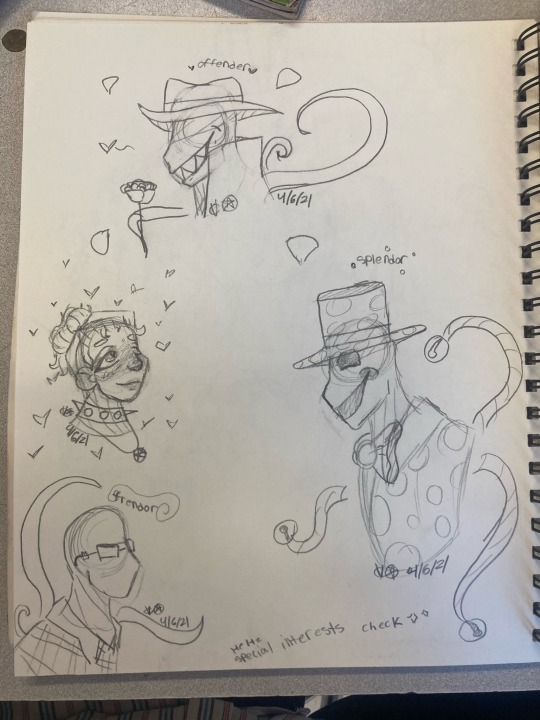
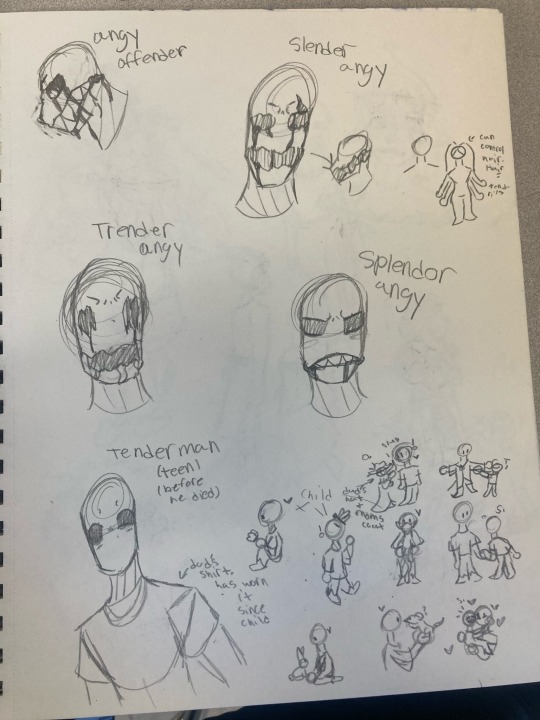
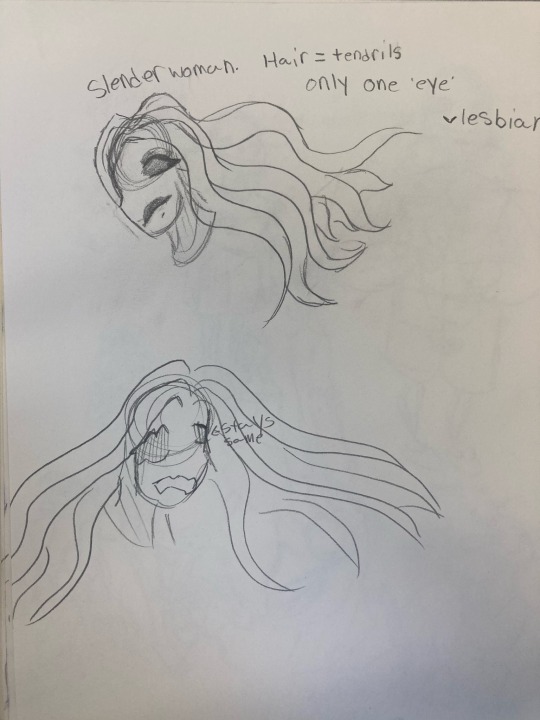
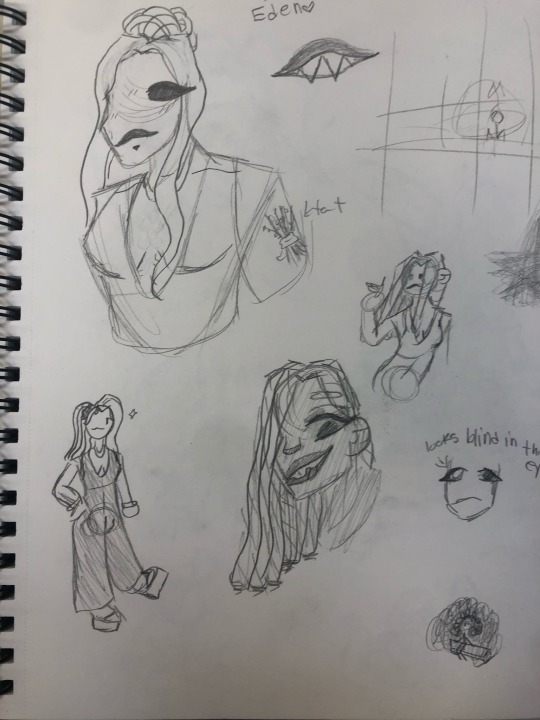
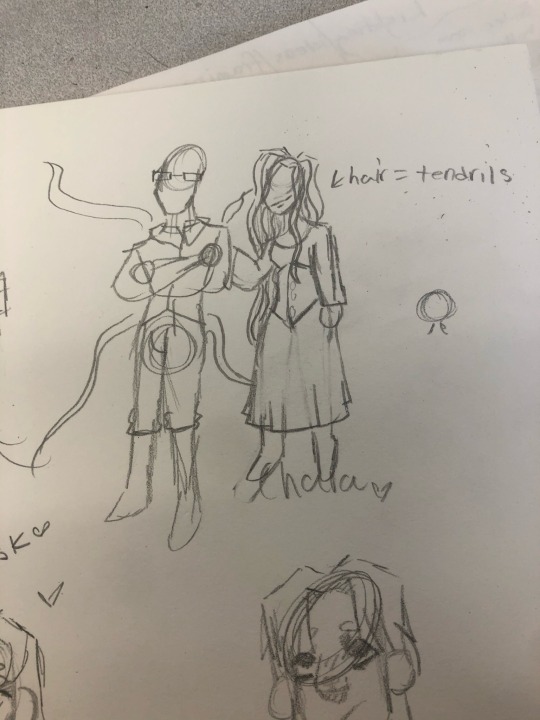
#slenderverse#slenderman#offenderman#trenderman#splendorman#Creepypasta#creepypasta headcanon#slenderverse headcanons#stars slenderverse
100 notes
·
View notes
Note
Oh your “Jenny being alive would make Giles WORSE in season 6” sounds Fascinating please expand!! (If you would like)
took me a hot minute but thank you VERY kindly for enabling me <3
so as y'all know, the point i always hammer home on dreadfulcalendarwoman dot tumblr dot com is that giles's character arc starts and ends with jenny. like she is the turning point for him in EVERY way wrt the way he chooses to interact with the world, despite her never being top priority in his life. i actually think it is so deeply interesting that buffy's unwavering love for giles is not enough to pull him out of his determined isolation, simply because she is The Slayer and she's Fated To Die and while she's come to terms on some level with her death, giles doesn't ever completely seem able to come to terms with the concept of losing her. so it's actually not gonna ever be buffy who can spur giles towards growth, partly because of that and partly because of the fact that she cuts him SOOOOO much slack. like that's her dad! she wants him to take care of her! she will forgive SO much of him.
jenny does not do that with giles. jenny draws lines and sticks to them to the best of her abilities and we have seen in canon how badly giles deals with those lines -- like in ted, where she essentially says "you being around me is bad for my recovery right now" and he behaves like she killed his dog or something. but the thing is that he still does register and respect that she's got boundaries, and he does try in his own way (hindered as he is by what some might call an unhealthy obsession with jenny) to adhere to the rules she sets down. there is also a very clear problem here in that jenny is super fucking inconsistent and what she allows giles is completely changeable and arbitrary up until the dark age -- like she is deliberately yanking him around because she wants to see how complete her control over him is, and still doesn't totally believe that it's absolute. and then of course GILES thinks that jenny KNOWS she has absolute control over him and is deliberately USING it, which i think definitely contributes to the resentment and anger of the angelus mess. but that's just canon.
ANYWAY i wanted to talk about that because i think it sets the stage REALLY NICELY for giles and jenny's dynamic in a canon where she lives! jenny represents this sense of normalcy and stability in giles's life -- in a lot of ways, his obsession with her is centered around this idea of her as his future wife and long-term life partner, which is something he never thought he would get to have or even WANT to have with anybody. canonically, in season three, the loss of jenny causes giles to double down real hard in his role as a watcher -- reflected in his suddenly incredibly rigid and starchy wardrobe, but also in the way he's no longer pursuing connections outside the scooby gang at all. losing jenny in canon makes it clear to him that he has nothing but being a watcher, and that he will fail at that as well if he allows himself to love someone the way he loved her (see: acathla). and loving jenny brought giles such profound joy that i don't think he ever wants to really handle the concept of never having that again, so of course he throws himself into watcher stuff instead of confronting that.
but in a canon where jenny lives (even in a canon where they spend the third season continuing to be a fucked up mess, which i think is realistic -- it's gonna take time for them to build something healthy after all the we-are-never-ever-getting-back-togethers of season two), giles no longer has that reason to double down as a watcher! instead he has this enduring and consistent possibility that he is allowed to love somebody without it blowing up in his face, and i think that that would genuinely help him so much. he wouldn't need to adhere so rigidly to Watchery Standards, he wouldn't WANT to do the cruciamentum if it ran the risk of hurting buffy -- he would start letting go of this pessimistic, cynical view of the world and the fact that buffy's doomed to die, and work instead on cultivating a home and a surrogate family with jenny. like at his core giles is a homemaker and he longs for community and family and a sense of belonging, just like the rest of the scoobies! he canonically likes being cast as the patriarch but labels himself as an "uncle" because it still gives him an out. i don't think he'd want to wriggle out of familial attachment if this was a world where he never had to experience losing jenny.
THING IS THOUGH, this is still a world where he loses BUFFY. and while canon giles cultivated this very deliberate distance between himself and buffy in an attempt to prepare for the eventuality of her death, this version of giles is one who has started to genuinely view buffy as a daughter and support her in that way as well. there's no emotional distance that he can fall back on to support himself through his grief. he has lost his daughter. in so many ways that is worlds worse than losing jenny before he ever got the chance to really love her, and i think it would have the potential to wreck him on a level that rivals canon.
so season six giles would be handling his grief in the same way that canon giles did -- he's throwing himself into a role that distances himself from the trauma of losing somebody he loves. this time he is ACTIVELY trying to distance himself from buffy -- not "for her own good," but because he just refuses to handle his grief, and even her coming back wouldn't shake his sudden understanding of the fact that she could die just as horribly and permanently again. and so in THIS version of season six he is very aggressively defining himself as Jenny's Husband and trying to push jenny towards having their own biological children and absolutely ignoring the fact that because of his insistent refusal to acknowledge his loss, his marriage is falling apart. he no longer wants to view himself as a watcher or as connected to buffy in any way, because he never ever wants to lose her like that again. that's his daughter. he cannot love her anymore because losing her destroyed him and he can't go through it a second time.
and jenny is just having A Time because she is a smart cookie! she sees why this is happening and she wants to be able to help giles through it! but she literally can't help giles when he is refusing to admit that there's even a problem. and poor buffy who is still dealing with the trauma of being ripped out of heaven also has to deal with and in some ways cater to giles, whose grief prevents him from being there for her in the way that she was genuinely expecting from him. like i think this is a canon where buffy and giles's relationship could have been at the place for her to tell him the truth, but then she comes back and he is a fucking mess and she does the whole depressed repression thing and tries to take care of him. Which Does Not Go Over Well With Jenny.
i'm not sure how this gets solved. i actually wrote a chapter of this a billion years ago wherein jenny and buffy and spike and dawn start forming this weird and incredibly sad family unit after giles leaves for england, and jenny and buffy kinda mutually struggle with this idea of a mother/daughter relationship after years of weirdness between them. i think that the onus would really be on giles to pull himself out of it, because he would have effectively burned his bridges with his wife HARDCORE by that point -- but it would still be a version of giles who had three more years of emotional stability than in canon. there's always a chance.
#asks#restlesshush#meta#headcanon#long post#(a little flfksdh)#rupert giles#jenny calendar#giles and jenny and buffy#ANYWAY this is my ''canon can be worse sometimes'' agenda#i think giles letting himself be buffy's dad and then having her die would fuck him up SO supremely.#and i think giles WOULD let himself be buffy's dad in a world where jenny lived#because jenny allows him to be emotionally vulnerable and encourages him to connect with others#(which is a much shorter version of this post lmaooooo)
31 notes
·
View notes
Text
mad for each other: a review of sorts cw: abuse
(i went into this show not knowing much except that it was about mental health and that people found it progressive. it’s 13 thirty-minute episodes, so it’s not much of a time investment.)
The first two episodes are pretty choppy in that the two “mad” leads dissolve into hysterics or uncontrolled rage every time they meet. It’s meant to show how they are misfits in regular society and also “crazy” by its standards. The man (Hwi oh) is a suspended cop with a history of assault and getting mandatory therapy sessions for his anger problem. The therapist is iffy at best.
Once we get past this setup though, the show becomes primarily about the paranoid female lead (Minkyoung) who lives an isolated life and in constant fear. She’s suspicious of everyone and takes steps all the time to ensure she can be safe in any situation, which often means she screams in terror and attacks people if they get too close or walk behind her for too long. (Which the male lead happens to do by coincidence) But is it really paranoia if your fears are real?
This is the part that’s amazing part to me: how they unfold exactly why she behaves this way. Why does she read into situations that seem harmless? Why is she suspicious of every single person she comes across? Why does she keep forgetting things she does all the time?
The narrative slowly delineates her history of abuse and the effects its had on her memory, her emotions, how she presents herself in public and her living situation. The focus is more on her and less on the events. I love how she consciously uses people’s assumptions about her “craziness” to protect herself. Hence, the open hair, the sunglasses and the flower behind her ear.
So far, Hwi oh is barely tolerable as a character, nor is his problem something that moves me. (He’s an angry cop!) What bothers me also is that in a story populated with women, there are mostly two kinds: absolute villains and ones the ML admonishes for being terrible people.
The writer saves this from being insufferable by writing the main secondary characters— women’s association president Kim Inja, part-timer Suhyun and Samantha— with some complexity and their own storylines. (I love all three of them)
It also helps that Hwi oh’s primary function from episode 3-12 (apart from romance) is to serve as a device to understand Minkyoung’s past and the journey she is on in the present. This is in addition to the arc we’re already on with her character.
Which brings me to why Minkyoung’s story is so compelling. She’s set up as an unreliable narrator of any scene she is witness to. It’s drummed in that she doesn’t trust herself either. This is what the writer uses to chalk out the complicated aftermath of trauma and abuse. From ep 3-12, the show centres her and peels of layer after layer to help us understand her behaviour. This is a person committed to survival, to her truth, and to learning to rebuild a life she has lost. She is shrill, hysterical and rude, everything that makes it easy for people around her to write her off. But the writer shows again and again, how in the face of suspicion and disbelief, even from a well-intentioned Hwi oh, she is right about everything and has absolutely valid reasons for how she does and does not defend her behaviour in public. Each time I think ‘surely, they will not take this particular thread to its realistic conclusion’, they do. WHICH IS WILD. Because every drama I’ve watched so far (except Law School) has hedged on a story like this. It’s also not held the "good men” accountable for their own toxicity.
All of this is why the literal and figurative car crash of a last episode absolutely ruins everything they’ve built till them. Hwi oh is shown to begin coming to terms with his anger until he absolutely loses it for “good reason” in defence of Minkyoung. The scenes where she confronts him about how his treatment of her, despite his best intentions, is just a degree removed from her abusive ex are so great. Then they fuck it up trying to tie up the romance between two “misfits” with a big bow. Except Hwi oh isn’t a misfit, he’s a cop with a history of going off the rails for ���justice” and “catching the bad guy” and one who doesn’t fix himself. (This a trope far past its expiration date in murder mysteries, it doesn’t have a place anywhere anymore.) And he gets her back using tactics very similar to her abusive ex.
(In a limited way, I’m coming to understand why dramas make this U-turn. The writers are usually women, PDs are often men, and South Korea has a not-so-great relationship with feminism right now. I’ve also seen women there talk about what it’s like to confront men in public places.)
Popular media takes so long to catch to up how it validates violent male behaviour and what that violence even encompasses. (Like Bollywood has barely caught up to its stalker heroes, and the Salman Khan industrial complex is still at its peak. How do we even begin to talk about emotional violence?) I understand that and it also fills me with rage. It’s effect is so visible here in India. I would love to know what South Korean women thought of this show. In conclusion, watch for Minkyoung’s story and Oh Yeon-seo, for a stellar performance by Gil Hae-yeon as Minkyoung’s mother, for Bae Ji-won, Lee Suhyun and An Woo-yeon and end at episode 12. Episode 13 does not exist.
(ps: why is a drug lord, trying to zealously hide his face, getting his food delivery in person🙄)
#mad for each other#as an aside#i just realised the law school yesul storyline reminds me of bollywood's pink#there's probably a way to right about upright angry men#it's not this#i also have zero patience think about it#coz my primary mood on most days is f*ck men
25 notes
·
View notes
Text
I have a lot of thoughts about A Court of Silver Flames, and since it helps me to write them out, I thought I’d share.
It’s behind a cut because SPOILERS and it’s long lol!
Nesta
I had expected we’d learn that Nesta had suffered some type of abuse or trauma as a child that Elain and Feyre were not aware of. I wasn’t expecting it to be so subtle, for lack of a better word. Abuse comes in a lot of forms, which I think SJM is good at showing. Emotionally manipulating your daughter for power, ignoring her in favor of your business and money … those may not be as visible as physical or verbal abuse, but they still cause damage.
I’m not sure how to convey it properly, but I thought it was important to show how the parts of her that were born from the abuse and trauma, while dark or not always healthy, were still useful. The wolf she became to survive her childhood helped her survive the cauldron. Not being able to “turn it off” is what hurt her. My favorite quote:
“So Nesta had become a wolf. Armed herself with invisible teeth and claws, and learned to strike faster, deeper, more lethally. Had relished it. But when the time came to put away the wolf, she’d found it had devoured her too.”
And as Amren said later “That’s the key isn’t it? To know the darkness will always remain, but how you choose to face it, handle it … that’s the important part. To not let it consume. To focus on the good, the things that fill you with wonder.”
I’ve seen a lot of fans upset that Nesta gave up her cauldron powers at the end to save Feyre and the baby. Although I’d initially hoped (post acofas) that her training would be more about her magic than physical training, I’m okay with how it worked out. She never wanted that power and she never liked having it. She stole it as revenge and she fought constantly to suppress it. Was she a badass when she wielded it? Absolutely! But ultimately, her giving it back was the final big step in her healing arc and acceptance of herself. (That doesn’t mean she’s “cured.” This will be an ongoing battle for her. I only mean this in terms of the story in this book.)
She chose to sacrifice it, unlike so many other times in her life when things were forced on her or happened to her. Unlike the future her mother had set out for her. Unlike when they were poor and her father did nothing to get them through. Unlike when she was thrown into the cauldron and then a war. Even unlike when she was forced to move into the House of the Wind, and her apartment – the one place she had chosen for herself no matter how run down it was – got demolished. I’m not going to go into the intervention too much. It was poorly done, but I doubt any of them had experience in doing one. A conversation acknowledging that might have been nice. And I’m not ignoring Feyre and Rhys’s hypocrisy of Nesta being confined to a place where she effectively had no way to leave on her own. The stairway at that point was not an option. But the bottom line is that Nesta needed help and was not in a position to willingly accept it or seek it out.
Regardless, she is still a lethal badass. She still has some of her powers, along with her fighting skills, which will only get better and better. So, the idea that she gave up what made her strong, or ended up as some meek housewife … I don’t agree with that at all. She has the intelligence and potential to become a force in leading armies. Not to mention her skill as an emissary. (Which Cassian finally learned how to imitate lol!)
On a personal note, I’m intimately familiar with the depression and self-loathing Nesta experienced in this book. Although I don’t necessarily react to those feelings in the same ways or exhibit the same coping mechanisms (I tend to turn my anger inward rather than outward), I could still relate to her journey. Her stubbornness and feelings that she didn’t deserve love or anything good or kind were presented accurately in my opinion. Parts were hard for me to read because of that. But I loved that she was able to make her way through the pain and finally begin to accept and love herself. And I especially loved that she was helped not only by Cassian, but by her friendship with Emerie and Gwyn.
And the House! Holy shit. The magic houses in this world piss me off to no end because they are not real and I will forever need to clean my own place LOL! Her relationship with the house was beautiful and funny and I love that she Made it! She needed a friend, someone to understand her, not only what she wanted but what she needed, and boom! The House of the Wind came alive for her.
So, overall, I loved Nesta’s journey. I’m happy she ended in a place that brought her inner peace and the ability to better deal with her problems in the future.
Nessian
I loved them before this book and I love them more after. The smut was a little shocking at first lol but I’ve read the Black Dagger Brotherhood books, which SJM loves, so really, it wasn’t that out there. I loved that Cassian showed that even with the mating bond, he could give Nesta space and freedom. In that respect, their relationship felt more mature to me than feysand. Their banter and the sexual tension was great! (The book is about a book.) They had some not great moments, as they have in past books. But those were realistic. People argue and say things they regret. But they also talk through it and apologize. This is a good time to point out – NOT ALL APOLOGIES INVOLVE EXPLICITLY SAYING I AM SORRY. There are other ways to show remorse and ask for forgiveness.
I don’t know if I had one favorite moment as there were quite a few. I think the most emotional for me was when they reached the lake. I know firsthand how difficult it is to speak aloud the things Nesta said. And I am also lucky to have people in my life who responded the way Cassian did – with love and support and kindness.
The nightmare scene, the prison scene, the dancing, the mating bond, Cassian turning the knife on himself … I loved them all!
The Valkyries
I fucking loved them! Gwyn and Emerie were absolute delights and I’m so glad Nesta made good friends of her own who she could be herself with. Their bonding over books, training, and their pasts was wonderful. Nesta urging them on and defending them from the Illyrians in the Blood Rite was a beautiful step in her healing. Before this book, I was hesitant about the foreshadowing that Nesta would take part in the Rite, fearing it would become some sort of white savior trope to help the female Illyrians. But I enjoyed the way it ended up happening. I know it seemed unrealistic for Nesta, Emerie, and Gwyn to get that far against warriors who’d been training for years. But part of the point was the males were arrogant as fuck. They underestimated the trio, to their detriment. Nesta and her friends used cunning as much as strength and skill to get where they did.
And I loved the image of Emerie and Gwyn just sitting back, sipping tea and admiring the river after going through a week of pure hell and winning the Blood Rite.
I hope we get more of them all together in the next books.
ETA - I can’t believe I forgot! Gwyn writing their story because their stories deserve to be told 🥲💕
The sisters
Overall I liked how things turned out with them.
Elain is still a bit of a non-entity to me. I don’t feel like I really know anything about her. Which, to some extent, is the point I think. There will be a lot to reveal in her story and she has a shitload of healing to do. She may have the appearance of adjusting and fitting in, but I don’t buy it. Nesta telling Elain to fuck off was awesome and long overdue. But Elain was also right in pointing out how others treat her and the trauma she’s experienced. I think there is still more to be dealt with between these two in the next book.
Feyre and Nesta were the more interesting relationship to me. The eldest and the youngest tend to butt heads in my opinion (and personal experience). So I was glad they came to an understanding. And very glad that Feyre did not get angry with Nesta for telling her about the baby. Rhys deserved the wrath for that.
One thing I would have liked to see discussed was the role of their parents in their lives. Nesta holds a lot of guilt for how she reacted to their poverty and I think that is understandable. I think Elain does too. However, I do not think any of the sisters should harbor blame for what happened. Their father was responsible for them. Period. Even if he was physically unable to work or help around the house, he still could have been a father. Yes, Feyre stepped up and fed them. Nesta and Elain didn’t help. It was his role to make them. Not in an abusive way. But step up and tell Nesta and Elain to do something, whether it’s chop wood or gather food from the wild. I don’t know. In my opinion, it is wrong to place blame on young girls who had a parent that did nothing. His actions in acowar were noble, but they don’t erase his failures. That all of this was glossed over disappointed me. I think this was something Nesta needed to be told explicitly by both her sisters. She had things to apologize for and feel guilt for, but she was not the one who should have protected Feyre. All three of them should have been protected by their father.
The Inner Circle
It’s kind of funny to me how blind they all are about each other. I don’t even know what else to say about their dysfunction.
Amren’s sudden desire for Rhys to become High King was weird, and though I should know better, I still really hope the series doesn’t end that way. The IC tends to have good intentions about things, but I don’t think they know how to handle a problem without some kind of force. And controlling all the other courts is not something that would happen easily, especially with perceived allies.
Amren and Mor thinking Nesta belonged or should be sent to the Court of Nightmares was a spectacularly shitty take. The lack of awareness and acknowledgement that Nesta was suffering from multiple traumas was just … unbelievable.
But considering how much this group does not see about each other, I guess it’s not a surprise. I don’t know how much is willful ignorance or just really, really poor people skills. I understand how this all makes for good angst and drama, I really do. But I’m just at the point where it’s grating. They need to sit the fuck down and talk to each other. It’s been five hundred years for fucks sake. 🤦🏻♀️😂
Rhys
Okay. I liked Rhys in acotar and acomaf. But the sparkly exterior wore off big time for me in acowar and acofas. I honestly could have done without him in this book. But I wasn’t foolish enough to expect him to not be in it. I’ve resigned myself to the fact that SJM has her favorites and Rhys is at the top of the list.
Having said that, he annoyed the shit out of me in this book. Someone really needs to explain to him that a choice between two awful things, one of which might be deadly, is not really a choice. I don’t have the energy for it, but better writers than me could write a thesis on the illusion of choice in these books. Which is, in my opinion, pretty clearly tied to the brand of feminism presented.
Not only is the choice given to Nesta at the beginning not a choice, Rhys doesn’t seem to consider Elain at all in his argument with Az. All other issues with that bonus chapter aside, he saw them. He saw the mutual attraction and consent. What happened to not forcing females to accept the mating bond? What happened to respecting her choice and autonomy? I considered the possibility that maybe since he knows Az, there’s a reason he thinks they wouldn’t work. But then, that pretty much flies out the window by him asking Az about Mor. Sure, Az is still hung up on Mor, but she is pretty fucking clear about her opinion.
The whole thing about not telling Feyre about the risky childbirth was awful. And not that I would expect it to happen, but not even mentioning abortion as an option was frustrating. That plot line was not good in any way. There were plenty of other things that could have gone wrong with the birth to push Nesta to act at the end. To be honest, the feysand dynamic is not great. While I appreciated her standing up to him about Nesta and other things, he very deliberately uses sex as a distraction to get out of arguments. Yet another way he never really seems to suffer consequences of bad behavior.
I will say I was really glad he got the opportunity to experience the full trauma of what Nesta went through. And my petty ass loved him kneeling before her at the end!
Miscellaneous
Where was Illyria?? My one serious expectation for this book was that we’d learn more about Illyria and deal with the revolution that was hyped up in acofas. To be written off in one paragraph was disappointing. It makes me think that if we are to ever get more details about the Illyrians, it might be in Az’s story. It was mentioned a few times that he hates them (with good reason) and would wipe them off the map if it was up to him. So I’m guessing his arc will require him coming to terms with that.
Elriel-Elucien-Gwynriel
I’ve never been super invested in this story line but I admit I’ve leaned more towards Elriel in the past. Partly because I like some of the complementary symbolism associated with them, but mostly because I’d really like to see a story about rejection of the mating bond. Even with the extra chapters, I feel like we still don’t know much of anything about who Elain truly is. And the same can be said of Az. So, those chapters didn’t sway me that much. With the exception of Az interacting with Gwyn. I agree with a lot of others saying Az has a lot of work to do on himself before he can be with anyone. I think Elain and Gwyn also have a lot of healing to do. SJM can take this in so many directions that I just don’t know what to think.
I will say that originally I was expecting the next book to involve a love square of Elain, Az, Lucien, and Vassa, because I did see a connection between the last two. But now … Was Lucien annoyed by Jurian and Vassa because he’s jealous? Just annoyed? I don’t know. I still think Vassa will be in the next books if only because of Koschei. But I’m not so sure about her involvement with Lucien. I think we’ve got enough people in this love polygon lol! Jesus, what a mess. But maximum angst 😂
#nessian#nesta archeron#cassian#acosf#a court of silver flames#acosf spoilers#emerie#gwyn berdara#azriel#elain archeron#feyre archeron#morrigan#amren#rhysand#acotar#acomaf#acowar#acofas#sarah j maas#feysand#elriel#elucien
49 notes
·
View notes
Note
Hey! My character is made into an experiment by the government due to him having a supernatural ability. The one who handed him over was his partner, who has been a part of that organization all along. He is usually a very confident person, powerful and extroverted. I'm not sure how his mental state is supposed to change? I don't feel like the whole loosing their will to live and becoming incredibly depressed thing would fit him as a person. How could I still show that the torture effects him?
There isn’t a sure fire answer to how any one person will change when they’re tortured. We know the possible symptoms, but most people won’t experience every possible symptom and we don’t have a way to predict who gets what.
There’s a post that talks about the possible symptoms over here.
Here’s the thing though: there is a lot of variety in survivors, in the symptoms they get and the way they personally express those symptoms. Some people do become suicidal. Some people do become depressed. And some people do lose their faith in humanity.
But there is not one universal survivor experience.
This means that there’s a big range in realistic responses. It also means that as a writer you actually have a lot of options. You should be picking 3-5 symptoms from the list of possible options, but the list has 14 things on it and some of those things can manifest in multiple ways.
I think that, since we can’t predict symptoms, the best thing you can do as a writer is pick symptoms based on what you feel fits your character and story best.
Depression and suicidal thoughts don’t do that, so let’s have a look at some of the others.
Memory problems are incredibly common in real survivors and are almost never portrayed accurately in fiction. You can read about the four basic types here.
I’d really encourage you to use one of these if you feel it fits your story. They create a lot of interesting narrative challenges for the character and they can make for really good emotional/introspective moments. If for instance you want to explore self-doubt giving the character memories he later finds out are inaccurate could feed into that, leading to him questioning whether he ‘really’ was betrayed.
General forgetfulness (ie low level difficulty forming memories) can give the character a lasting disadvantage in everyday life, creating a much more traditional injury-recovery arc as he tries to find adaptions to this new normal.
Intrusive memories, when handled well, can help create a deeper connection between the reader and the character. Because it lets you create situations where the character’s mood flips in an instant, the other characters don’t understand why but the readers do.
Memory loss can be trickier, mostly because it’s rarely handled well in fiction. It doesn’t effect older memories, such as childhood memories, the person’s name etc. It almost never effects memories of torture itself. But it does effect other aspects of the time they’re held, the period prior to capture and sometimes a few weeks after release. It’s a distressing and disorientating experience and it’s a good pick if there’s any sort of investigation or prosecution.
Because memory problems (especially memory loss and inaccurate memories) are a big part of why torture trials are really hard to conduct. Having the character find that he doesn’t actually remember the crucial details and watching the process of people trying and failing to help him, that can be a really powerful addition. It’s also a good way to form a rift between him and his friends without depression or having him lose faith in others. It gives a reason for any distance between them, even if it’s an emotional rather then logical reason.
Read through the masterpost and really think about whether any of these memory problems could fit your story.
Narratively speaking memory problems don’t link the character’s personality but they do have a strong impact on plots and sub-plots. Memory loss, inaccurate memories and intrusive memories will all effect the character’s emotional arc and sense of self. They can also throw up barriers for the character.
He might be missing a couple of crucial details about his life before he was snatched. He might have some key details about how and where he was snatched wrong. Think about how those sorts of problems could feed into your plot, because they can add interesting conflicts and challenges.
Chronic pain is also incredibly common in torture survivors and it often doesn’t have a single cause. Back, muscular and joint pain are particularly common.
It can lead to a character seeming angry, unapproachable, anti-social or like they have a hair-trigger temper. It can also make it seem as though they have really bad mood swings or a short temper.
This can lead to interesting character moments as non-survivors struggle to empathise with an ‘asshole’ while the survivor is struggling to express the fact they’re in physical pain. It can also lead in to discussions of disability and the way we treat invisible disabilities in society.
It can also often be improved by, again, life style adjustments and sometime medication.
If you wanted to use addiction as a symptom then chronic pain is a common reason behind addiction in survivors. Essentially they start taking more and more powerful pain medications in order to try and feel ‘normal’.
Chronic pain doesn’t always lead to addiction though. Making good, consistent life style adjustments (using a mobility aid, being able to sit instead of having to stand for long periods and so on) can help keep pain at manageable levels allowing a healthy relationship with pain medication.
Insomnia is another really common symptom in survivors. This basically means the character is always at least slightly sleep deprived. Which has knock on effects on absolutely every part of a person’s life.
You can read about the effects of sleep deprivation here.
I’d suggest thinking carefully about what you need the character to do before using this one. It might sound counter intuitive but a character with disabling chronic pain is probably more capable of the occasional bout of superheroics then a chronically sleep deprived character is.
Insomnia caused by mental illness is also notoriously difficult to treat. Medication for the mental health problems survivors tend to have makes it harder to sleep and reduces the quality of sleep. Medication to ‘make’ people sleep often decreases the quality of sleep, when it works. It does not work for everyone.
Essentially don’t treat insomnia as an ‘easy’ option with less impact on the character. It impacts every part of a person’s life, making them more likely to get sick, slower to react, more emotionally volatile and less able to learn/remember everything.
There are so many things that insomnia effects that- well I find it easiest to think of it as a permanent lowering of ability across all categories. This does not mean that a character automatically becomes incapable of things; it means they are worse at them then they were before.
If they were already really good at something then other people might not notice the difference. But the character himself will. Which can have a knock on effect on self esteem.
Any of the things I’ve mentioned can result in social isolation. Because survivors can come across as aggressive, volatile and inconsiderate which can lead to people… avoiding them. Especially when other characters don’t have a good understanding of mental illness or experience dealing with trauma survivors. (Having said that, remember that a pretty significant proportion of the population experiences mental health problems at some point in their life. Think about how likely experience vs ignorance is, rather then assuming one or the other.)
Isolation exacerbates pre-existing mental health problems.
And any combination of the above symptoms make up the frame work of any long term personality change. For instance you describe this character as confident and capable: if he gets multiple forms of memory problems does that impact his confidence in certain areas? And if it does how does he cope with that? It could be by expressing his self-doubt but it could also be by taking a more passive role within a group, letting others take the lead instead of stepping in.
I have an old ask over here that goes through how I pick symptoms for a character and how I vary them depending on the sort of plot I have in mind.
Wrapping up, I think that we make these symptoms individual when we consider how the symptoms interact and what that means for the character.
Depression does not have to mean someone looks overtly miserable. It can look like nausea, like struggling to eat and sleep, like being quieter in social situations. It can feel like going through life disconnected from the world, not so much the presence of misery as the absence of joy.
You’ve listed these characteristics; confidence, power, extroverted and survivors can hold on to all those things. As always the central point is nuance. Because that confidence probably won’t be completely unshaken anymore, that extroversion might not be effortless anymore, his relationship with that power could change.
The character might have developed a lot of self doubt and, though it’s a struggle, continue to make firm ‘confident’ decisions because he feels that’s important either to himself or to everyone else. It could be a way of him showing that he’s still ‘strong’, that he survived, that he can still support the other characters.
The character could still be extroverted and depending on the symptoms you pick socialising might be harder, it could take up more energy. He might be hiding the cost from his friends. Or, another common way it plays out, is that he could just come across as… a lot more inappropriate: making dark ‘jokes’ that non-survivors don’t find funny, having obvious mood swings that make others uncomfortable. You get the idea.
Torture does change people. But those changes are unpredictable and they often don’t look like we expect.
Our fiction often tries to use depression and suicidal ideation as an excuse to turn survivors into passive objects. They are not.
One of the things that stood out to me the more I looked at prominent survivors was anger. Because yes, despair is possible, common even. But so is spite and vitriol and rage. So is determination.
There is more then one way to be powerful. Confidence does not need to be unshakable to be real.
In essence: you are aiming for an understandable change in what is already there, not an excision of the characteristics you’ve already established.
As a final note you might want to take a look at the masterposts I have on medical experiments (which you can find here and also here.) It’s worth deciding whether you want to show unethical but genuine experiments, or torture. You can have a look through the tags on unethical experimentation and pseudo-scientific torture for more information.
I hope that helps. :)
Available on Wordpress.
Disclaimer
#writing advice#tw torture#tw medical abuse#writing survivors#writing recovery#tw suicide#effects of torture#torture and memory#chronic pain#insomnia#choosing symptoms#writing symptoms#unethical experimentation#pseudo scientific torture#fantasy ask
75 notes
·
View notes
Note
And Theon bc I love him
WHAT A COINCIDENCE I LOVE HIM TOO (this answer is gonna be a combination of books and show)
Send me a character and I’ll tell you the following:
• Did they live up to their potential? / In what ways was their potential unachieved?
-I would say yes. The only negative I have about his general arc is his death (which, see below). But Theon from the very beginning was, though not a particularly nice person, still relatable. Feeling othered, wanting to be accepted by an immediate environment that doesn’t accept you, isolated from and ostracized by your family, and the tension that comes between serving the different types of familial relationships in your life. Theon has no idea who he is, tossed aside by his blood family for not growing up with them and being “soft,” aka sort-of moral and having emotions that aren’t selfish rage or smugness (which, yep, that second part is a mood, see: my entire childhood and how no one wanted to be around an “emotional” “soft” child). And from there, he spirals out of control in a way that, while certainly not admirable by any stretch of the imagination, is still understandable in the context of the narrative and his characterization. And from there, after going through hell and quite literally losing himself (even to the point of straight-up denying rescue), he builds himself back up gradually, to the point where he expressed extreme regret for what he’s done, helps an innocent woman escape a truly horrifying situation, acknowledges that his family is generally garbage, and (in-show b/c again books aren’t finished), helping to restore his sister to power, rescuing her after his PTSD relapses while confronting Euron, and ultimately opting to protect the Starks come hell or high water in order to genuinely atone for what he’s done. He is no longer conflicted because he wants to do the right thing, and that right thing is defending the kingdom from the White Walkers and making sure Sansa and Bran are safe. And it’s no longer about fulfilling a duty or finding a family to fill the void. Because now he has found himself. I will contend that Theon has one of the best, most nuanced, most organic redemption arcs of all time. I will forever be grateful that I got to see that piece of storytelling unfold.
Although, I would love to know what he thought of Dany. A missed opportunity, that.
• How they negatively and positively affected the story.
-Positive: His arc of identity and finding where your loyalties lie ties into the overall theme of “How do you find yourself in a world where goodness, authenticity, and honesty are often punished and increasingly rare?” And it proves that governmental politics aren’t the only defining factors in decisions: familial politics can be just as difficult and dangerous, which adds yet another rich, complicated layer to the overall story. He has a genuine, honest-to-Drowned-God redemption arc, which is...not really present anywhere else in the story (no, Jaime is not on a Redemption Quest, I will die on this hill). But I think the biggest draw of Theon’s presence is that it deconstructs the whole “Character Revenge Fantasy” idea. He does bad things. We want him to be punished. But not like that. No one deserves that. How far is too far? What does retribution really look like? Given how easily that idea can be abused and go off the rails, is retribution even something to strive for? What is the point of using extreme violence/torture/mutilation/breaking someone’s psyche when it doesn’t really accomplish anything? Isn’t atonement and genuine justice a better option? It certainly was for Theon. He could only piece himself back together and do anything meaningful once he was out of his abusive environment. All of these are imporant questions that are posed by his existence in the narrative.
-Negative: Idk if I have much to say here. My biggest problem is his death (see below), but that’s not really a negative story effect so much as...being disappointing and narratively irrelevant. I gotta say, his introduction via his sister was...really weird. I genuinely have no idea why GRRM wrote that. It never came up again or had any kind of narrative ramifications and kind of cast a strange, uncomfortable light on his relationship with Asha/Yara for the remainder of the story. I can ignore and enjoy their later relationship it if I don’t think about it too hard, though, so I guess I’ll chalk it up to GRRM having a Bad Idea.
• What my favorite arc for them is.
-All of it?? Theon’s journey is kind of...one big arc, which is why I think it works so well. He has this overarching redemption plot which spans the entire series and informs every decision he makes (for good or for bad, depending on where in the aforementioned journey he is). The redemption arc isn’t bogged down with side plots or other pieces of narrative clutter, meaning it has time to grow and, thus, be gradual and realistic. If I had to choose a specific point, it’s probably when he tries to reintegrate back into society via supporting Yara. Gaining the Iron Islands’ support for her ruling, spiriting away with Euron’s fleet, and ultimately rescuing his sister after her capture. He can’t just go back into society. He’s scared. He has really bad PTSD. But he recognizes that putting his home in good hands is something bigger than just him because it’s Yara’s home, too. I just...I really love family relationships, y’all.
• What I think of their ending.
-I’m not really sure how I feel about this one. I get that the series is GrimDark™ and that people who make the right choice and fight for good die all the time, but Theon dying just felt...wrong. To me.
And, like...I get it. It makes sense to parallel his original descent into villainy (cemented by executing those two boys and pretending they were Bran and Rickon) with him dying to protect Bran himself. It ties into the whole very common trope of completing a full redemption arc by committing a completely selfless act at great personal cost. It’s kind of like the whole Missy thing in Doctor Who (which...hoo boy, that post is coming, make no mistake), where selfishness is directly opposed by making the ultimate sacrifice with no motivation for personal gain. And the fact that the last words he ever heard were “You’re a good man?” I cannot even begin to describe how much that makes me sob. But...honestly, I’m really tired of this idea that redemption has to end in death in order to be achieved or “complete.” I think it’s much more poignant to have a redeemed character live to help build a better world. Because what’s the point of telling people to be better if the “reward” is death? No one’s going to want to reform themselves if they think that’ll be the result.
I think the thing that Bugs Me™ the most is that Theon never really got to have a moment of peace when he was alive. Sansa gained the North’s love and at least had a secure childhood. Ned and Cat were happily married for years. Arya had parents who loved her and a good relationship with Jon. Jon fell in love with Ygritte and found his Night Watch Bros, and Robb (in show verse) had some very happy moments with Talisa. Davos put great stock in what he considered fulfilling friendships with Stannis and Shireen; Brienne was treated respectfully by Renly, Catelyn, and Sansa; Missandei and Grey Worm had each other and their friendship with Dany, who herself had many personal successes in her quest for the Iron Throne and saw the death of her abusive brother. Cersei even had moments with Jaime (who himself had several notable military victories and at least some time with Myrcella, as well as being gladly and deeply in love, however dysfunctional that love was), times when she successfully fought off enemies (including her dad), and some sweet moments with Tommen, as well as a huge victory via blown-up sept at the end of season 6. Theon was treated as a second-class family member by the Starks his whole life by being “traded” to them as a condition of war resolution AS A BABY, is immediately disparaged and mistreated by his immediate family when he tries to return to them, makes terrible decisions that almost cost him his conscience completely, is brutally tortured by Ramsay, is on the run with his sister from Euron almost immediately after, and has a PTSD attack that ultimatly results in him having to launch a rescue mission. And then he fights ice zombies. And then he dies. He never really...got to be happy at all? There was never any kind of “win” for him. Not even survival. The narrative couldn’t even give him that.
TLDR: Theon’s death seemed less shock-value-y than others (like, for example, Shireen or Missandei or, heck, Melisandre even), and it isn’t the worst thing I’ve ever seen. It’s narratively-informed and it makes sense as an emotional through-line, but, ultimately, Redemption Cemented By Selfless Death is a tired trope, and I honestly thought this story (which...you know...serves as a deconstruction of common fantasy tropes/book tropes in general) was better than that.
• When I wish they had died. / If I think they should’ve died.
-So here’s where we get personal™ kids.
So, it’s no secret that I am...severely mentally ill. I’ve talked about expression/presentation of mental illness in regard to Cersei a lot on this blog, and how that (as paradoxical as it may seem) helped bring a sense of comfort and emotional resonance to me. Theon, post-Ramsay, has, I think, a very clear case of PTSD. Theon is one of the few characters I’ve seen where his mental illness isn’t the cause of the bad, violent, dangerous choices he makes. It only takes root after he has made the decision and conscious effort to better himself, and it, rather than demonizing him, serve to humanize him. His trauma didn’t define him. And although a PTSD attack led to him unintentionally losing Yara to Euron’s capture, he makes every effort to rescue her, a goal he does end up achieving. It is so rare I get to see a character who goes through these things, successfully fight them and come out with positive qualities at the end. Like...switching topics a bit here, Jaime going back to King’s Landing to (try to) escape and ultimately die with Cersei made sense to me because, as Jaime says, he is a hateful man. He never made much of an honest effort to be anything else. And he never truly wanted to be good; he just wanted to be liked. He wanted to adopt some personality that would make him feel less disconnected from the rest of the world. But Theon...genuinely feels remorse for everything he’s done. He makes a concerted effort to do everything in his power to improve the lives of people he believes are good and deserve to be safe. So, just...killing him off in a Completely Selfless Sacrifice (like...you know how a lot of mentally ill people put themselves through suffering-like OCD rituals, bottling feelings, self-harm, even suicide-in a misplaced attempt to “help” or “protect other people”) seemed antithetical to everything we saw of his arc.
Ultimately, with such a humanizing, empathetic portrayal of trauma and mental health struggles, seeing Theon be killed off just...pissed me off. I am so tired of seeing mentally ill characters die. I really want to believe that I can live through and thrive in spite of the things that afflict me, and I get example after example of characters not being allowed to do that. It feels awful, quite frankly. And it makes hope that much harder.
I also just feel like...there was nothing the story gained from his death? I get the thematic parallels as mentioned earlier, but it didn’t really move the story forward in any significant way. It didn’t motivate other characters to do anything, it had no political ramifications, it didn’t serve to contribute to any kind of happy ending or commentary on society, it just...was sad. Again, I thought this story was better than that.
#theon greyjoy#got#my son#mental illness in media#meta#redemption arcs#tw: self harm mention#tw: suicide mention
11 notes
·
View notes
Text
why supergirl season 5 was actually good: sort of an essay
This has been sitting in my sticky notes for months and I figured now that I have a Supergirl blog, I can actually post it.
People love hating on Supergirl Season 5. And I get it. I admit that it had a lot of problems. But I did like the season overall, and there's enough out there about Season 5’s problems, so here is a post about some things that were great about Season 5!
1. Lena’s Arc
Apparently everyone hates how this was executed, but I really liked it. I like how 5A allows her to scheme and lie and altogether explore the darker (Luthor) side of herself, because only after experiencing what she’s been afraid of becoming can she fully come to know herself. I like how in 5x07, she gets to scream and cry, to express to Supergirl how much she’s hurting, and how betrayed she feels. I like how in 5x13, Kara finally accepts that Lena joining Lex was not her fault, and that she didn’t deserve to be manipulated (“From now on, you’re accountable for your own actions.”). I like Lena’s growing obsession with erasing human pain through 5B and the fact that we know exactly where her motivations come from, and we feel for her because we’ve seen how much pain she’s in herself -- but at the same time, we can still oppose her ultimately villainous actions, which leads us to hope for her redemption. (A lot of this is due to Katie McGrath’s stellar acting as well.)
I love how the season shows just how much Lex’s continual abuse and manipulation affects her, and shows her standing up to him at the end. I wish they had focused more on Lena instead of pushing her aside in favor of Lex in 5B, but overall I liked how they expanded on the Luthor sibling relationship from Season 4, even if it was missing some of the complexity of the previous season. And finally, I love the way Lena fights so hard to regain Kara’s trust in 5x19 (and succeeds!). It felt like there was more of a balance between the two starting from 5x13, where previously it had always been Kara apologizing and trying to gain Lena’s trust.
2. Supergirl’s New Look
PANTS. PANTS. PANTS. PANTS.
For Season 4, Kara the Reporter got a more professional wardrobe as she began to mentor Nia, and the switch to pants feels like the same thing for Supergirl. It completes the transition from “young adult” to just “adult.” It may have been reasonable to call Kara a “girl” in Season 1, but by now, she is an adult woman, and I’m glad that her wardrobe reflects that.
I was opposed to Kara’s bangs at the beginning of the season, but they have definitely grown on me. Like the pants, I think they mark an important change in Supergirl’s character, one that is better appreciated by the audience than the characters. Now, when I rewatch previous seasons, I think, “Wow, Kara looks so different now.” I didn’t think that when I rewatched episodes after Season 4. The bangs are a way to identify Adult Kara as having changed a lot from how she was at the beginning, and like the pants, I feel like they complete her transition into adulthood.
(But are the writers expecting us to believe that nobody who knows Kara would be suspicious that Kara and Supergirl got bangs on the exact same day? Seriously.)
3. Eve Teschmacher
In Season 4, Eve Teschmacher was a brilliant, eager-to-please young woman who (whoops) turned out to be evil. And she was great. But I was dissatisfied with her betrayal because it came so out of the blue, and it was a complete 180 without much buildup at all. Season 5 gave her the humanity that she was lacking, first with her mom, then with her desperation not to have to kill. Not to mention, some pretty badass fight scenes.
4. J’onn’s Swagger
J’onn’s storyline in Season 5 is not nearly as deep as in Season 4, and I see that as a good thing. Season 4 J’onn was wonderful and necessary, but in a season that has a lot of strong development for Kara and Lena, it was nice to have a relatively static character who’s at a good place in his life. Season 4 let J’onn discover the man he wanted to be, and David Harewood brings a new confidence to Season 5 as a result of that. It’s fun to watch him strut around in his supersuit and say normal things as if they’re great proclamations. It’s nice to see the happy, healthy adult relationship between him and M’gann. The easy trust they have with each other causes them to act more like they’re married than dating, as opposed to the younger characters who are often caught up in relationship drama.
5. Kelly Therapy Face
All the characters need a therapist, and they finally got one! Well, Kelly is technically a psychologist, which I believe means she could be a therapist but is not necessarily? I don’t know things. Anyway, it’s nice to have a calm, supportive presence in the group, and this effect is helped by Kelly Therapy Face. Kelly Therapy Face is the face Kelly makes when she’s listening to you talk about your problems. Kelly Therapy Face and her generally calm presence bring down the interpersonal drama of the group and solidify the idea that all these people are growing into full adults, with adult relationships and adult responses to issues. Their emotions are stabilizing, they’re building stronger support systems, and they’re gaining a better understanding of how the world works and their places in it.
This is more of a Season 4 thing -- this season really didn’t give Kelly the screentime she deserved -- but I also love how even though Kelly acts as a source of support for others, her own fear and trauma are rarely glossed over (see: the end of 5x05). This gives Kelly a humanity and realistic quality that many emotional-support characters don’t get. It also shows the key difference between Dansen and Sanvers: whenever Alex and Maggie had conflict, they swept it aside rather than working through it, leading to their eventual breakup, but when Alex and Kelly have conflict, they listen to each other and try to fix it. In accordance with their adult-ness, Alex and Kelly also seem to be in agreement that it’s okay to have conflict in their relationship (“And I might not know every little detail about you yet, but I know you,” 5x02).
6. Reality Bytes
Calling attention to violence against trans folk, exploring Dreamer’s dark side, and showing the strength of Kara and Nia’s mentor-student relationship in one episode? Just. Yes. Either Nicole Maines was projecting a lot or she’s a really good actor (probably both), but either way, as a trans person, I felt this episode on a personal level: the anger, fear, and frustration at knowing that your community is being targeted and the people you’re supposed to trust (i.e. the police) are probably not going to do anything about it. Additionally, Kara and Nia’s conflict in 5x15, and the fact that Kara compares Nia’s experience to her own, is a great marker of how far Kara has come. In Season 1, Supergirl felt a similar anger and hurt when villains sought her out, but by now, she’s more at peace and can offer Dreamer reassurance and comfort.
7. Brainy’s Plot
Brainy’s storyline in Season 5 is nice because it manages to remain stable as an important, but secondary, plot. It enhances the sense that there’s more going on than we realize and gives us a view into the scheming of the villains, while not taking over too much screentime or audience brainspace.
8. Jon Cryer
As annoying as it is that the writers gave up a lot of Lena’s screentime to Lex, Jon Cryer’s performance in Season 5 is just wonderful. He can go from acting totally in control to screaming in a matter of seconds. Lex Luthor is witty, assured, and charming in a weird way. On the other side of his personality, he is a madman who cares about no one’s interests but his own. Jon Cryer’s acting manages to package all this great but conflicting writing into a brilliant, awful, occasionally sympathetic villain who has more than his share of awesome (and terrifying) scenes.
9. Alex’s Grief
I like that Alex gets to let go of her emotions a little this season and express herself. Especially when Jeremiah dies before 5x16, Alex has a really tough time (and a mention of her possibly drinking problem! Expand, please!). She tries to escape from the pain of real life through virtual reality, but eventually realizes that she has to face her pain rather than avoid it, which is a major theme of the season. What’s great about 5x16 and the next couple episodes is that the other characters allow her to grieve. They could have told her to get over it and see all the happiness in the real world — it would have fit with the theme — but instead, they support Alex as she grieves. They listen without judgement when she expresses her anger that Jeremiah left and forced her to take care of Kara. Kara and Kelly are (mostly) understanding when Alex doesn’t want to go to Jeremiah’s funeral, and when Alex arrives late at the end of the episode, Kara lets her know how much she appreciates that Alex came at all. Throughout her life, Alex hasn’t had much opportunity to be herself and express her emotions, an idea that’s repeated over and over again starting from her coming-out arc in Season 2 or even earlier. Now that Kara can for the most part take care of herself and Alex has a good support system, she finally gets the opportunity to be vulnerable.
10. Andrea Rojas’s Moral Ambiguity
Is Andrea good or bad? Neither. She’s a person who wants love, success, and money, who does sketchy things to promote her company but also fights fiercely for her father and cares about the safety of her technology. Before Andrea, Lena was the main morally ambiguous character, and she could be categorized as “playing for her own team.” However, Andrea goes a step further, crossing into a territory I would call “not playing a game at all.” She’s just a human being trying to have a good life, and that causes her to do good things, bad things, and everything in between. In a show that often accentuates the difference between heroes and villains (“Don’t let them down by stooping to his level,” 5x15), Andrea is a reminder that most people aren’t good or bad -- they’re just living their lives.
TL;DR: They’re all adults now and Lena needs a hug.
#supergirl#supergirl season 5#kara danvers#lena luthor#j'onn j'onzz#kelly olsen#dansen#nia nal#dreamer#brainiac 5#alex danvers#andrea rojas
17 notes
·
View notes
Text
The Mandalorian S2: Style Over Substance – A Companion Piece
This is a companion piece to this video where I examine the strengths and weaknesses of the first two seasons of The Mandalorian. It’s a collection of ideas and evidence that were cut for time or focus reasons from the main video. I’ve included both timestamps and quotes of what section of the video each idea refers to. Under a cut for length.
[1:48] Akira Kurosawa, whose movies would be very important in the western genre was very big on complete and realistic sets and effects because it helps the quality of an actors’ performance.
“The quality of the set influences the quality of the actors' performances. If the plan of a house and the design of the rooms are done properly, the actors can move about in them naturally. If I have to tell an actor, 'Don't think about where this room is in relation to the rest of the house,' that natural ease cannot be achieved. For this reason, I have the sets made exactly like the real thing. It restricts the shooting but encourages that feeling of authenticity." – Akira Kurosawa, Something Like an Autobiography
[2:27] Like the original trilogy, The Mandalorian has its fair share of humor. The sequel trilogy also had a lot of humor, and was criticized for it, but it wasn’t the humor itself that I think people had a problem with, it was how the humor was done. See, in the original trilogy humor never changed or undercut the overall tone of a scene. If a scene is tense humor might lighten or even break the tension but never undercut it. The original trilogy would never, ever, make fun of the plot, character, or scenes in its own movie. The Mandalorian follows this mold of lightening or breaking tension without undercutting the scene itself which also helps it feel like the OT.
Just Writes video on Bathos is a good expansion on this idea. Personally, I find that particular brand of humor, popularized by the Marvel movies, extremely off-putting because it just screams at me to not take the story seriously and that makes it pretty hard for me to stay immersed in it. My three favorite marvel movies are Guardians of the Galaxy, Black Panther, and Thor Ragnarok because Black Panther doesn’t really do that kind of humor and Guardians and Ragnarok manage to make it seem natural by genuinely being comedies.
[7:18] This brings us to Episode 4. Last time I criticized this episode, but I wasn’t very specific, I just mentioned that we were starting to get away from showing and towards telling. Let’s take a closer look.
The first part of this scene, where the kid was being a nuisance, was actually really good. It kind of seemed like it was going to lead into some genuine frustration with him being a nuisance and therefore maybe some drama in their relationship.
[9:51] Cowboy Bebop is another space western with a strong style and a mix of vignettes and episodes which advance a characters story. But every single episode builds up the themes of the overall story even if the plot has nothing to do with it.
To be fair, not every episode builds up *Spike’s* story and themes, but Cowboy Bebop has four main characters and every episode works towards at least one of the characters’ stories, characterization, or relationships.
[12:20] Mando’s mistrust of IG, when they really have quite a lot in common, speaks to something about his character.
What does it speak to exactly? Well, everyone might have their own opinion about that but here’s mine:
IG-11 used to be a hunter, but now Queel has reprogrammed him. Mando still sees the droid as the hunter and is adamant that it can’t be trusted no matter how much Queel insists that Mando must trust his work reprogramming the droid as an extension of trusting Queel himself.
Now, why does Mando hate droids so much, and particularly this droid? Well, that’s an open question, but I have my theories. Part of it is the trauma he experienced when he was young, but I think it runs deeper than that. You know how sometimes the traits that really bother you the most in other people are the things that you don’t like about yourself? The IG-11 that Mando met is a lot like the part of Mando that I’ve been calling “The Professional.” IG is efficient and ruthless, just like Mando on a job. They are deaf to moral and personal appeals in the face of a contract. This is also the part of Mando that took the kid to the Imperials in the first place, the part that he conquered and redeemed by the end of the third episode.
But IG has been reprogrammed. Just like Mando, he has changed and now cares for the child over himself. IG even develops a personality, and at one point attempts to tell a joke. But because IG reminds Mando so much of that part of him he had to defeat, he can’t bring himself to trust him. The tension between them persists pretty much up until IG fully demonstrates to Mando that he is there both to care for the child, and for Mando. In this moment Mando begins to really see how similar they are.
This connection makes it hard for him to let IG make his sacrifice, and he even appeals to this by telling IG that he thought his old core functionality was gone. But by reactivating his old functionality as a part of his new core function, IG is also giving Mando a template to incorporate his Professional self into his new self. He shows Mando that those two halves of his self that came into conflict back in the beginning can be synthesized into one new whole. He doesn’t need to reject any part of his identity.
Then the newly synthesized Mando dons his jetpack, fulfilling his only stated desire in the entire season, and defeats a scenery chewing villain to win the day.
But that’s just my interpretation, and I’m willing to haggle over what exact interpretation the evidence best supports.
[15:29] Speaking of Luke, let’s talk about fanservice. Now to be clear, there’s nothing intrinsically wrong with fanservice, what matters is what always matters: how you use it.
This also applies to the other two “Trademarked Star Wars Problems” I mentioned in the last video: repetitiveness and hamfisted merchandizing. These things are not necessarily bad. For example:
I would bet Baby Yoda is the most successfully merchandized product since the OT, but there’s nothing wrong with that because they’re part of the story being told. Baby Yoda doesn’t distract from the story, they are part of the story. On the other hand you have Ewoks, which were originally going to be Wookies. I would bet they went with Ewoks at least in part to sell more cute toys…but at least they still sort of work with the story. In TLJ the penguin things are there for no other reason than to be cute and sell toys. Same with the crystal dog. They have literally no purpose in the story, and their obvious and prominent inclusion only to sell toys distracts from my immersion.
Obviously repetition is part of stories. That’s why we have tropes, and the Hero’s journey, as tools for a writer to communicate information quickly. Just from his outfit we know a lot about Han before he ever opens his mouth, same with Obi-Wan. In RotJ, the heroes need to blow up the Death Star again. It’s kind of annoying that we’re literally doing the same thing we did two movies ago, but at least it’s a little different. In TFA Han Solo reassures us that the Starkiller Base isn’t that big of a deal by saying “don’t worry, there’s always a way to blow it up.” This is an example of a character reaching out from the script and telling the writer to change their story because the repetition is getting ridiculous.
[18:32] So…why is it here? Yeah, I know who Thrawn is. I don’t know why Ahsoka does, or why she cares, or why I should care. If the writer had cared about that they would have made her talk to Mando about it so she could give some sort of story or character-based explanation for why she cares, instead of just dramatically saying his name.
I mean I know the most likely reason it was here: to build hype for her solo show, but they could have done that without punching my immersion in the kidney.
[20:20] So it was no surprise that in the end the Expanded Universe’s greatest hit of all piloted his X-Wing into the show. But, I didn’t mind this. They had been seeding that a Jedi would be coming to collect Groghu for a while now, and if you had been running through the timeline in your head you were probably at least half expecting this. It’s foreshadowed well, it’s part of the story, and it triggers our emotional climax.
The reveal is quite well done too. First it’s an X-Wing, then we see a Jedi dressed in Luke’s RoTJ gear but it’s over the security cameras so there’s no color, then we see it’s a green lightsaber, then they clearly show that it’s Luke’s lightsaber hilt, then they finally have him peel his hood back. Each small reveal builds up the suspicion in your mind that it’s Luke until it’s confirmed.
That being said I would totally understand if someone thought it was obnoxious and hamfisted to shove Luke into another story, even though it did work for me.
[29:12] Parts of it even connect back to Mando’s story and character, though not in a new way because it’s mostly a redo of Mando’s relationship with IG last season.
I understand that Mando breaks his rules a little bit more here, but it’s still a riff on the same theme of: Mando has a conflict with a character, the he sees the similarities between between them, and then circumstances force Mando to take his helmet off in front of the character.
However if his arc with the other Mandalorians was functioning properly than this could work as a synthesis of a change in ideology and a reassertion of his willingness to bend the rules, but instead it just comes across as another redo of stuff in the last season. It’s still halfway functional because by this point it’s easy to forget that Mando had a character arc last season and it reminds us of that right before they pull the trigger on his and Groghu’s separation…but redoing the development from last season doesn’t count as a real character arc.
[31:08] There is so much more I could say about all of the bad writing, plotting, and characterization in this season. There are so many things that just don’t make sense, waste our time, or just plain don’t work.
I’m still confused over what the writer was trying to do with the snow planet. Like they crash land there and Mando decides to go to sleep inside his hull-breached freezing ship and the fish chick is like “Mando this is dumb you should fix your ship” and then he just fixes it. What was even the point of handing Mando the Idiot Ball there? Why not just have him fix the ship without trying to commit suicide by hypothermia first? Like…what?
[31:27] Why are you just listing off a bunch of names that mean nothing to us like she’s a video game character telling us where we need to go next?
I want to point out that even though I’m using this footage of Delphine as a reference she’s actually managing to tell you something about Malborn and why he is trustworthy, so it’s actually better than what Bo is doing. Though to be fair the tidbit about “the forest planet” is cute since it will be a deforested planet when we show up, that line needed some character connection to not sound so weird.
[33:13] That’s what the point of Show Don’t Tell *really* is, it’s not about how much dialogue you use or whether a character is explaining something. It’s about using exposition to tell us something about a character at the same time. It’s about putting the camera in a place that shows us something about the character or the action, not just what’s happening. It’s about packing as much of the story as possible into every choice you make.
In Avatar, the way that Zhao tells us about Zuko’s banishment tells us a lot about both Zhao and Zuko. The camera angle here emphasizes Katara standing encouragingly over Aang’s back as he stares dejectedly at the ground (contrasted with Toph’s angry stare) and tells us about the nature of Katara’s relationship to Aang as his teacher and friend as opposed to Toph’s. In the opening shot of A New Hope, the low angle of the camera implies dominance and the length of the Star Destroyer shows us the long reach of the Empire. Every single time Zuko is on screen it is worth paying attention to which side of his face is dominating the shot: scarred or unscarred. Exactly what each side represents is up for debate: I tend to think of it not as good Zuko vs. bad Zuko but more as Zuko’s feelings of obligation to his family and people and Zuko’s obligations to his own sense of what he believes is right and what he needs to self-actualize.
Show Don’t Tell is just a saying. It’s a saying to encourage writers, particularly new or inexperienced ones, to focus on the *art* of telling the story instead of focusing solely on the plot and facts. I am using it somewhat liberally here to say it’s about “using exposition to tell us something about a character at the same time” but since that is about the art of telling stories, and not just a recitation of facts, it does technically count.
[34:32] With television shows and the way they can go on forever, and with how much money there is in going on forever, it seems like they always become a sagging mess at some point. Some of them manage to bring the quality back, but some of them don’t. So to a certain extent, these problems with the Mandalorian are kind of normal for television shows.
I can’t remember exactly where I stopped watching How I Met Your Mother, the last thing I remember is Ted dating some crazy girl and swearing off relationships. I abandoned The Expanse midway through season 2 earlier this year…maybe I’ll go back but boy was I bored. I made it all the way through the Wire. Season 2 had its problems but eventually got back on the right foot midway through or so, but the problems came roaring back in season 5 which it took me almost a year to finish because it was so agonizing.
Avatar is probably the most controversial choice here of a show in which the quality slipped but I firmly believe that if they cut out the second half of season 2 and the first half of season 3 the show would have been much, much better. Most everything in Ba Sing Se is tonally weird and the whole idea of a city with too many rules and bureaucracy is way too complex an idea for this show to tackle. Avatar does tackle incredibly complicated and adult themes for a kids show but in my view this was one step too far. They get Zuko to a place where he’s ready to join the Aang Gang but then have him backslide temporarily. There’s this whole idea of an invasion on the Day of the Black Sun but it would be such a story cheat to allow Aang to beat the Firelord without actually mastering the four elements and so obviously isn’t going to work. All of these things together just make it feel like wheel spinning where the story and characters aren’t actually growing or developing but just being padded out.
Except for “The Tales of Ba Sing Se” and “Appa’s Lost Days” obviously, those are great.
It’s actually pretty funny because the episode before Aang is supposed to fight the Firelord the first time (the Black Sun time) he’s a nervous wreck and everyone is trying out different psychological techniques to try and make him feel better which is…I guess sort of valuable for kids to see that nervousness is normal. But when you compare it to the second time he’s going to fight the Firelord, for real, it’s *so obviously* for real this time because Aang is having a *character* based crisis about the conflict between his pacifism and his duty to stop the Firelord. The comparison of the two is telling in terms of what was going on in the story of each.
[35:03] Now they are spinning it out into not one, not two, not three, but FOUR different shows all based on the Mandalorian. It’s almost gross how hard they are milking this.
Okay apparently they fired Gina Carano so I guess it’s not four anymore. Or maybe it is who knows. Listen, the point is they *intended* to make four shows okay.
[35:06] Thanks for watching all the way through to the end. These videos take a ton of time and effort so that means a lot. Even though I’ve reset my subscriber count to zero now that I’ve criticized the Mandalorian, I will continue to work on the channel as much as I can, so subscribe if you want to see more videos like this.
I promise to always give you my honest opinion.
Also I know I was shooting for one video a month and, well, I still am but these videos are really time-consuming. I want to make sure I maintain a really high level of quality and so sometimes I get halfway through a video, realize it’s no good and have to start over with something else. Sometimes it takes months of rewrites to get it to a place where I’m happy with it. This one came out pretty quickly, it was about 6 weeks from when I started the script to when I uploaded. Hopefully I’ll only get better and more efficient at it as I get more practice.
2 notes
·
View notes
Text
Star Wars Rebels Rewatch Thoughts and Partial Review
Okay this is going to be a bit long because I have a lot of things I’d like to talk about. When I talk about the characters and standout episodes those are mostly my thoughts. When I talk about seasons as a whole those are more of a review.
I remember first hearing the announcement that rebels was going to be a show, reading the synopsis, and being immediately enthralled and excited. I love Luke, Leia, Han, Chewy, Obi Wan, clone wars Anakin and Ahsoka, but I was really interested in seeing how the empire’s rule would have affected other people and liked the idea of having a survivor of order 66 be part of the main cast. I remember this show fondly because unlike the clone wars, where I got into it in season 3, I got to watch this show all the way through from start to finish in real time. After a rewatch I still hold it in high regard and think that season 1 while not the best was a solid introduction to the characters, their struggles, and the beginnings of a wider rebellion with seasons 2-4 being great.
Characters
Ezra:
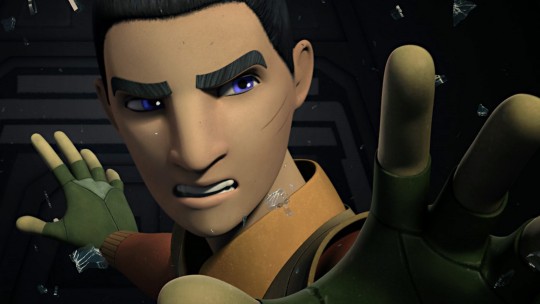
Ezra is a character I have conflicting feelings about. In seasons 1 and most of season 2 the show seemed to struggle with what exactly to do with him and force him into every storyline even if the storyline would be better with focus elsewhere. This caused the show to give the rest of the ghost crew very little focus in season 1 and it wasn’t until season 2 that you got actual development and backstory for them. In seasons 3 and 4 this isn’t nearly as big of a problem and there are a lot more episodes dedicated to the rest of the main cast and they all have plotlines and arcs separate from Ezra. He also wasn’t the most interesting and, in my opinion, the least interesting of the main cast until twilight of the apprentice, which made the intense focus on him to be frustrating at times. Once the end of season 2 rolls around they do a much better job with him. Ezra is a character that I found to be by far at his most interesting while interacting with Darth Maul and struggling with the dark side. His struggle with the dark side was over way too quickly in season 3. He’s a character that I could see being a bit similar to Anakin in that his intense fear of being unable to protect his friends and family drives him closer to the dark side and this was shown wonderfully in twilight of the apprentice and steps into shadow. I was disappointed that they didn’t explore it more in depth because it could have been incredible. My only other problem with him in season 3 was how wildly inconsistent how capable he is was portrayed. In some episodes he would really screw up in ways that he should know better by now, like turning his back on a dangerous hostage and getting him and Sabine attacked, or too capable and “wise”, like when they had him “end” the clone wars and get the separatist and republic fighters to see his point of view. That last one bothered me because it took a lot of the nuance and sad pointlessness (because in the end both sides lost and were taken advantage of by the empire) of the clone wars and had Ezra, someone who didn’t even really understand what happened, resolve the conflict. They did take steps back in his development at the beginning of season 4, which I didn’t understand, and made him relearn the lesson “how we fight is what matters”. This is quickly rectified though and I absolutely loved what they did with him from Jedi Night on. His end saving his home world was fitting and I found myself sad to see him go. I’m conflicted on Ezra because I didn’t really like him that much in season 1 and a bit of season 2 and found him to be a lacking main perspective, but really liked what they did with him in seasons 3 and 4. Overall I liked him as a character, but not as the main perspective.
Kanan:
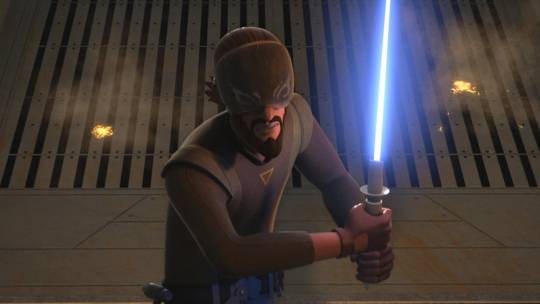
Kanan is who I felt should have been the main character. His journey of finding who he in the midst of tragedy after being forced to cut off a part of himself for so long and having to come to grips with having to face his trauma to do what’s right was fascinating. I liked how he was knighted despite the fact that he was so counter to what the Jedi were during the republic and I felt that was purposeful. Kanan seems to be the template for the new Jedi knight in a way. When Yoda gets around to training Luke he isn’t stuck to the old ways and doesn’t discourage attachment and I think that could have been influenced by Kanan. Kanan throughout rebels opens up more and more to people and suffers greatly, but because of those connections he isn’t tempted to the dark side. Every time he is beaten down it’s his care for others that makes him get up. His blinding and how he learns to connect with others and the world afterwards was one of my favorite parts of the show. He has to learn to see not just the world differently, but the force and everything's connection to it as well. He actually grows to become more pacifistic in a way and learns to better understand the feelings of the people and creatures around him. His relationship with the people around him grow and change as he does especially his relationships with Sabine and Ezra. He grows into a father figure of sorts for them during the course of the show. When his end finally comes he seems at peace with what will happen and dies so that his crew may live and Lothal will have a fighting chance. His death, while I knew it was coming since his introduction, was one of many emotional gut punches of the show and I really cared when he died. Kanan was my favorite character and I loved his growth in the show. I thought overall they did a really good job with Kanan and they seemed to know where they wanted him to go from the beginning. He was always meant to grow as a person and teacher with him finally dying for what he believed in and the family he made.
Hera:
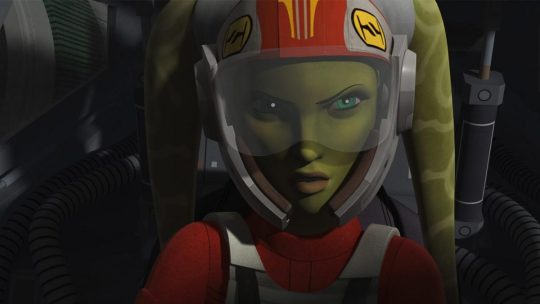
I really liked Hera as a character. I appreciated that her idealism did not equal naïveté. I think those two are too often associated with one another. Having Hera be idealistic and yet have the most realistic outlook of the ghost crew was refreshing. Hera truly believes in the rebel cause and puts everything she has into it. She creates a tunnel vision on fighting for a better future because war is all she has ever known. Hera doesn’t know what to do without a battle to fight and very nearly lets herself be consumed. She even states herself that she is fighting for a better future but has never considered a future for herself beyond the fight. She is pulled back from the brink by Kanan. Kanan and Hera have my favorite relationship of the show because there is actual communication between them. There isn’t any forced drama and you can tell what their relationship is through their actions. In the quiet moments between and after battles. It was devastating to see how Kanan’s death effected her. Shutting herself off from others and even doubting the cause she’s dedicated her whole life to. Hera was always the one encouraging everyone and providing hope when it looked lost, but in this moment she unravels and can’t do either of those things. And this realization that nothing last and that her new family may also be lost like much of her birth family carries through even after she regains her will to fight. When Ezra is going to turn himself over, despite it being what she would do in his place, she begs with him to find another way and it tug at my heartstrings because we know why she’s like this. She was always the pragmatic one that put the mission first and in this moment she was throwing it out the window and acting from her hurt and desperation. In the end even when Ezra turns himself over she does command the forces alongside Sabine and successfully help Ezra free Lothal. I really liked her character and my only real gripe is that I wish they had focused on her more in the earlier seasons. She also has some incredible feats while flying and the things they had her do were really creative. I really liked how capable she was behind the “wheel” and how that was a product of her love of flying and dedication.
Sabine:
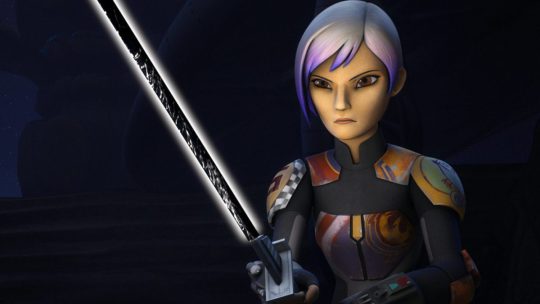
Sabine was a character that I was initially very intrigued by. The fact that she was mandalorian and was at one point in the imperial academy were enough to get me interested, but the first two seasons didn’t explore much about her. When the episodes Trials of the Darksaber came around and the bombshells about her hand in Mandalore’s downfall and her family’s betrayal I was left in shock. I really liked these revelations at the time and appreciate them more in hindsight. Everything about her character in the first few seasons makes a lot more sense knowing her past. Horrible weapons don’t have to be created by bad people. Pride and arrogance can blind you and that’s what happened with Sabine, but she chose to own up to her mistakes and try to set things right. That’s what makes her one of our heroes instead of a villain. I really liked the way they handled the exploration of her guilt and determination to do what’s right. The sibling bond that her and Ezra grew to have ended up having some of my favorite moments of the show like when her and Ezra make eye contact in the finale and she distracts Hera for him to go and turn himself over to Thrawn. Overall I like what they did with Sabine, but once again felt like she should have had a bit more focus in the earlier seasons.
Zeb:
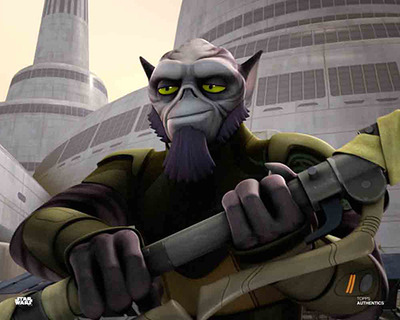
Zeb was a big casualty of the shows problems with spreading out the focus. He’s a character that actually got more focus in seasons 1 and 2 than he did in seasons 3 and 4. There was a lot of potential with his character that the show didn’t fully explore like his survivors guilt and his anger toward the empire because of the genocide. Zeb is a survivor of a genocide like Kanan and I think the show should have put an emphasis on their understanding of each other. It’s said but not shown nearly as much as I felt it should have been. I did like the storylines that did put focus on him though especially how he plays off Kallus in the show. From bitter enemies to reluctant allies to friends. And his relationship to Ezra was touching at times like how he hugged Ezra after Kanan’s death. Zeb is a character that I liked, but thought was underused the most out of the main cast.
Chopper:

Chopper was a surprise to me. I expected him to just be the token droid and he seemed like he may be in the first two seasons, but he actually gets a lot of development is seasons 3 and 4. Chopper doesn’t want to be put in a y-wing in the season 3 premiere and in Hera’s Heroes he’s frozen when he sees the y-wing he crashed in during the clone wars. There’s and underlying sadness and trauma there that is made very clear despite not real words being spoken. It’s also very clear that below his tough, cranky exterior he really cares about the members of the ghost crew. When Kanan dies he goes and holds Hera’s hand and makes sure she isn’t alone during this time. I loved this because it shows how close they really are. Hera shuts everyone else out at that time but Chopper. I truly felt by the end that chopper truly was part of the family of the ghost crew not just the token droid.
Kallus:
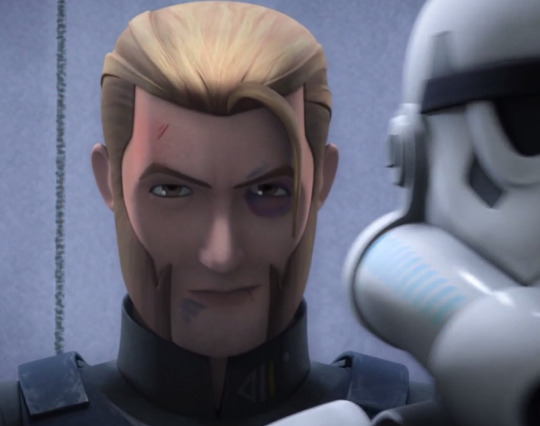
Kallus started out as a character you loved to hate and cheered when he lost. Kallus was threatening despite being unable to defeat the rebels in seasons 1 and 2. He was giving a good redemption arc that was kick started in the episode “the honorable ones” in season 2 where he is shown compassion by zeb and forced to reevaluate what he thought of the empire when he learns more about the rebels and their compassion for each other. The end of the episode perfectly juxtaposes zeb being found and happily accepted back by the rebels with Kallus returning to the ship with no one noticing he was gone and his poor condition with him sitting on his bed alone and disillusioned. He is finally faced with the reality of the empire’s cold calculation and uncaring nature and the rebels’ caring, fierce protectiveness. In season 3 I found him to be one of, if not the most, interesting character in the show. He had some fantastic episodes that centered around him like The Honorable Ones and Through Imperial Eyes. I really liked his storyline and how his relationship with Zeb became a story of compassion and forgiveness. The idea of breaking free from your programming and risking your life and everything you worked for because you now know what the right thing to do is the heart of Kallus’ journey. Rebels managed to turn a character I wanted to lose into a character I cheered for and was worried about when he was in danger. I wish he was used more in the 4th season when he’s with the rebellion because I think that would have been a fascinating dynamic for the show to explore.
On a side note: One small but telling moment with Kallus was when Thrawn is first introduced and everyone is praising him Kallus instead points out that civilian casualties outnumbered rebel casualties on Thrawn’s last mission and he is told that those numbers were acceptable because he brought the empire victory. Kallus looks displeased for a split second before getting his expression under raps.
Thrawn:
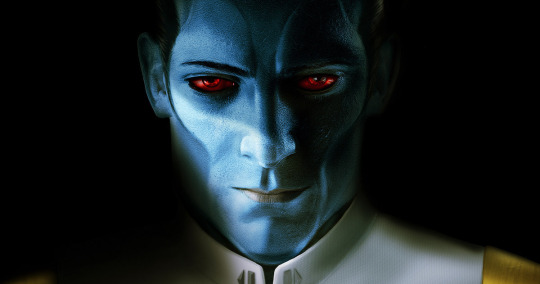
I really liked Thrawn as a villain. His cunning and genius was always intriguing when shown onscreen. I always felt like he was threatening and at times he even seemed unstoppable. Through Imperial Eyes showed a lot more sides of Thrawn than we had previously seen. He was a capable fighter and noticed intricacies within art that lead to him deducing Kallus’ identity as fulcrum. He was easily the best recurring villain of rebels. I never saw Ezra and Thrawn as true adversaries until the final episode of the series. He couldn’t be taken down unless something happened that was beyond his control and, at least I thought, it was implied that the force wanted Ezra to succeed in his mission to free Lothal and rid Thrawn from the rest of the rebel conflict. That the force had influenced the outcome in Ezra’s favor which just goes to show how much of an unstoppable force Thrawn was.
Standout episodes:
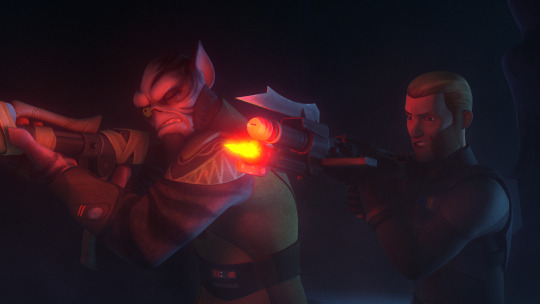
“The honorable ones” is a decidedly more nuanced look at soldiers within the empire. “I was… I was only doing my duty. I didn’t ask questions.” This the first serious look into the inner workings of empire soldiers that I had seen up to this point. Kallus’ arc was about overcoming his training, drive, and brainwashing that what he was doing was right. That it was for the betterment of the galaxy and the protection of the empire and its people. He was sent into a battle he believed had to be fought believing that “it wasn’t meant to be a [genocide]”. All I could do was sit there and be amazed that we were actually getting a look into what soldiers must have been told and expected to do and realizing that what was happening around them wasn’t supposed to happen, but there’s no going back. It’s already been done. Having their fellow soldiers killed while on routine patrols just for being empire. Zeb tells Kallus “you can’t judge all Lasats by the actions of one” and Kallus shoots back “well does that apply to the empire too?” and it’s a valid question. The possibility of people being forced into the empire or taken when they are young and trained to believe what the empire tells them without being given a choice or even not truly believing and questioning the empire but being afraid to act out because of the empire’s power are all put onto the table here. As well as it being revealed that the soldiers aren’t given all the information about what the empire is doing and what they plan to do in their conquest. Not everyone within the empire wants to wage war and genocide. Not everyone is beyond redemption. I applaud this episode for daring to go here. It was willing to try and humanize the empire’s soldiers and kickstart one of my personal favorite character arcs of the show. With Kallus’ arc it managed to turn someone who was initially shown to be pretentious, ambitious, and cruel and have him admit to his wrongs, defy his programming, and risk his life and everything he ever worked for to do what he now knew to be right.
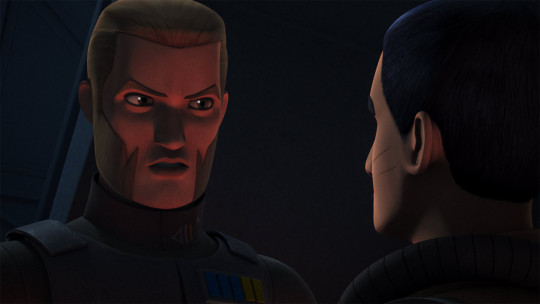
“Through imperial eyes” shifted the perspective character to Kallus with a very interesting choice to open with the audience seeing things through his eyes. This episode showed just how good Kallus is at being the rebel spy. He pins the blame on someone else through a series of well thought out actions and uses his observations and skills to evade capture and detection. Neither Kallus or Thrawn are depicted as anything less than cunning. Kallus is only found out by a blunder on Ezra’s part and the fact that Thrawn is a genius. The change in perspective to Kallus was a breath of fresh air. The change is tone and genre from action adventure to a kind of spy thriller works to the show’s favor. This episode showed both Kallus and Thrawn at their best and cemented Kallus as one of the most interesting characters in the entire show.
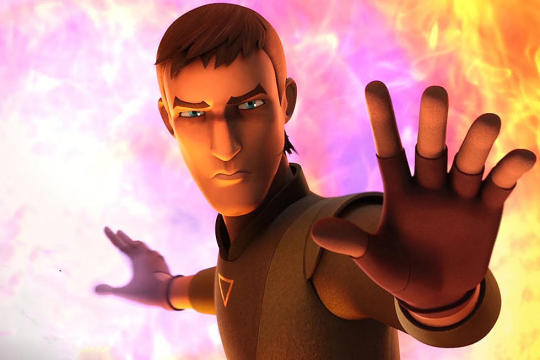
You can’t talk about standout episodes and not talk about “Jedi Knight”. This episode is probably the one, next to the finale, that I got the most emotional about during my rewatch. When I first watched this episode I remember there was a foreboding feeling throughout that the Ghost crew’s luck would finally run out. The entire episode was tense and despite knowing the outcome on my rewatch I was still on the edge of my seat and hoping the inevitable wouldn’t happen. The Kanan and Hera dynamic is touching and sad. I wanted them to get around to saying what they really meant and when they finally did I was sad because I knew their time together was at a close. I still wish they could have had their happy ending. Kanan seemed so accepting like he knew what was going to happen to him, but was okay because he would go out protecting the people he loves. When Kanan’s death finally happened and the episode quietly faded to white with ashes blowing past the star wars rebels logo I had to sit back once again and let that episode sink in. Kanan was my favorite character and his death impacted me and you could tell in that moment how much the ghost crew was hurting. I really liked this episode and thought it was well done from the music, to the dialogue, to the animation. Kanan’s death scene was one of the most visually stunning of the show and that moment when he regained his sight to see Hera, the woman he loves, one last time is etched in my memory.
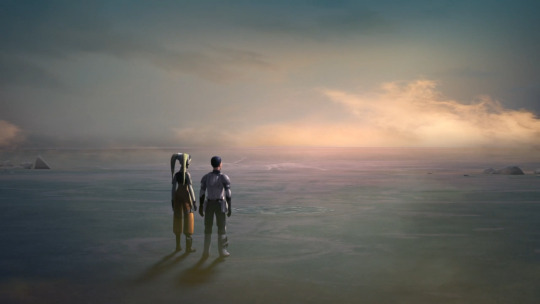
“A World Between Worlds” was a really good episode focusing on loss. This whole episode was fantastic and I loved the idea behind the world between worlds. Finally getting closure about what happened to Ahsoka and having the ghost crew especially Ezra and Hera get closure for Kanan’s death were really well done. I especially liked when Ezra was given the chance to save Kanan and he struggles to let go and accept that he can’t save Kanan and the rest of the ghost crew. The struggle to not save his master and surrogate father almost overwhelms him and it is only through Ahsoka’s guidance and his own inner strength that he is finally able to let go and accept kanan’s death. “He’s gone now, isn’t he? I mean, really gone?” This line hit me like a ton of bricks while rewatching because there could be no more denial by the ghost crew (and myself). Kanan’s death was set in stone. This realization happens while looking out at a beautiful view at the temple and Hera has her hand on her shoulder where Kanan’s force ghost had touched her before. Ezra get one last look at the loth wolf Dume on the horizon before he fades from view giving him closure before turning and heading back to the ghost and the future. This last scene with Hera and Ezra staring out into the horizon and then turning back to the ghost after their closure makes me think that this symbolizes them looking back at the past, the good times, and the people they’ve loved and lost and turning back to the ghost is them turning back to the fight and the future instead of letting the past continue to hold them back despite how beautiful the past is and how painful the future and present may be.
Rebels has incredibly strong season openers and finales with the most well known being twilight of the apprentice, but all of them were great.
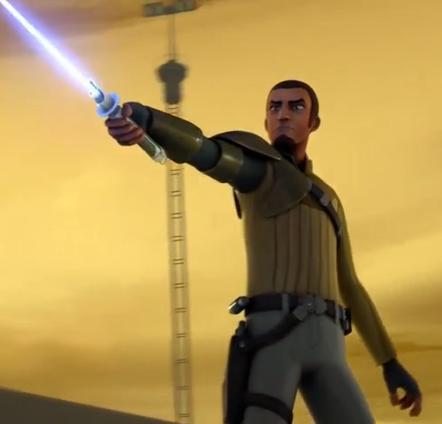
Spark of the rebellion was a solid beginning to the series and did a good job of introducing us to the ghost crew. While the weakest of the season openers it contains one of my favorite moments of the series when Kanan reveals himself to be a Jedi. That scene still gave me chills upon a rewatch. It was a solid introduction to the ghost crew and gave a glimpse of what was to come.
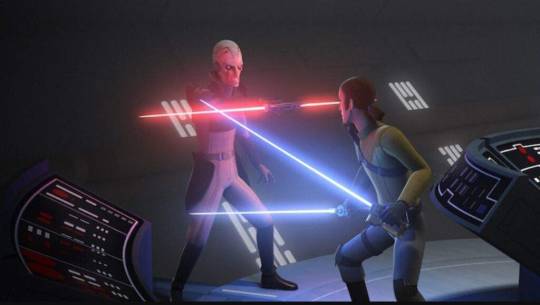
The finale of the first season was easily the strongest episode of the first season. Kanan’s rescue and fight with the inquisitor were both very exciting. The Inquisitor’s parting words to Kanan “There are some things worse than death” was incredibly foreboding and still gets me excited for what’s to come (even though I know what’s going to happen). I like it when Kanan steps up to the plate and takes out a powerful enemy like the inquisitor and maul. I still really like that the burn Ezra gets on his cheek stays for the rest of the series.
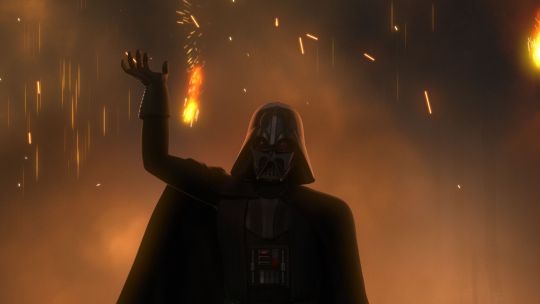
The second season premiere “the siege of Lothal” was an instant game changer and had our characters come face to face with Darth Vader for the first time and had Ahsoka discover his identity as her master. The rebels being driven off Lothal changed everything that was to come. This was where the massive jump in quality between seasons 1 and 2 became apparent. The stakes were immediately ratcheted up. The rebellion was forced to flee and Lothal was thought to be lost. Darth Vader was imposing and it was made very clear that none of the rebels stood a chance against even just Vader let alone the empire.
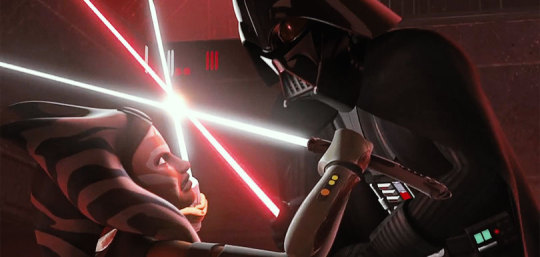
Twilight of the apprentice had me reeling for a few day after I watched it for the first time. I couldn’t get what had happened and how it had ended out of my head. How would the ghost crew move forward with this? How far to the dark side will Ezra sink? How will Kanan fight now that he is blinded? Was this the end for Ahsoka Tano? The second season finale is some of my favorite Star Wars content period. The long awaited confrontation between Ahsoka and Darth Vader, Maul’s return, Kanan being blinded, and much more. The final lines between Ahsoka and Vader with Ahsoka saying she won’t leave him again and Vader responding with “Then you will die” showing just how far gone he was and that he truly was no longer the caring person Ahsoka once knew, but a bitter empty husk. Everything was phenomenal in this two part finale. I think twilight of the apprentice is in a way comparable to the empire strikes back in that the good guys didn’t really win in the end. Both Maul and Vader lived, kanan is now blind, and nobody knew what happened to Ahsoka with heavy implications that she was dead (later proven wrong). There wasn’t a rebel victory. In a way this finale was truly the beginning of all the trials that would come for both the rebellion and the ghost crew. I still get excited every time I revisit it even knowing how everything pans out. This is the moment that cemented rebels as one of my personal favorite cartoons.
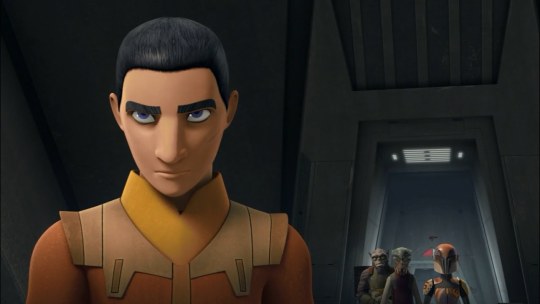
The third season premiere “steps into shadow” was another strong two part opening. Ezra’s struggle with the dark side and Kanan and Ezra reconnecting after Kanan distances himself were series highlights for me. The scene where Kanan tells Ezra to let go and trust him was emotionally resonant and showed that despite Ezra’s anger and frustration on the inside he was still a scared kid that just wanted to do what was right and got in over his head. While Twilight of the Apprentice got me really interested in Ezra as a character and where Dave Filoni wanted him to go these were the episodes that really got me to start liking him, kind of ironically I’ll admit. I do think they should have taken Ezra’s foray into the dark side further, but I’m happy with how they executed it in these two episodes.
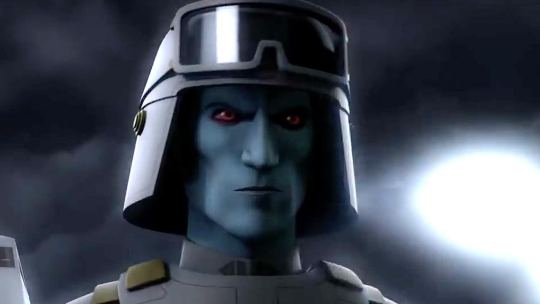
The third season finale “Zero Hour” was a thrilling conclusion to the season and saw many things come to fruition. Thrawn was an incredibly threatening and capable villain. His capability and smarts weren’t undermined in his loss because his plan would have worked if his subordinate obeyed and the Bendu wasn’t on Atollon, which are both things Thrawn could not have predicted. He still gets incredibly close to wiping out the rebellion despite both of these and still survives and has the manpower to threaten the rebellion again. It goes to show the rebellion that they aren’t ready for full out war with the empire because they are outnumbered, outmanned, and outgunned with almost no advantages save their unpredictability which can only get them so far. Seeing the rebellion so close to being completely wiped out rattled me. I had forgotten how bleak the fight looked for the rebels and how many casualties had occurred.
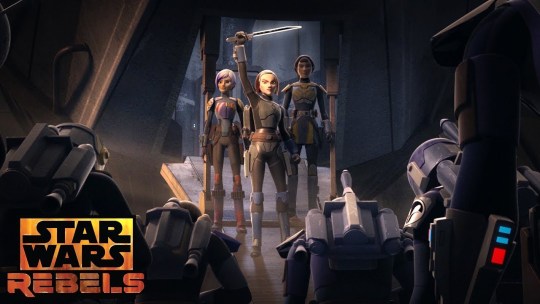
The season 4 opener is meant to show a victory after the near destruction of the rebellion that ended last season showing that there is still hope for the rebellion. I really liked seeing Sabine leading with the darksaber and her finally being able to confront her mistake and destroy her creation once and for all. Bo-Katan’s return was exciting. I always enjoy seeing characters from other star wars media appear in rebels. Bo-Katan being the influence Sabine needs to ultimately do the right thing and getting the darksaber afterwards to lead Mandalore felt fitting as someone who has seen the clone wars.
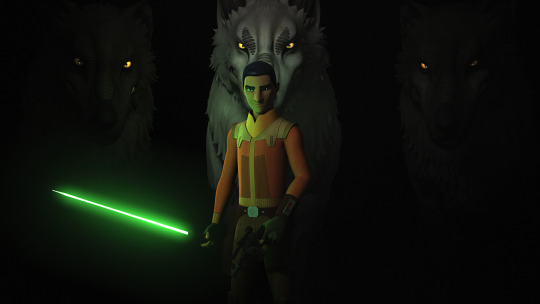
The season 4 finale is once again emotional and tense. It’s incredibly fitting that the ghost crew’s journey together began on Lothal and ends on Lothal. Everything comes full circle and Ezra and the pergil are able to free Lothal and defeat Thrawn, but him and Thrawn are jettisoned away on a star destroyer not to be heard from. The moment where Hera is desperately trying to come up with a plan and Ezra and Sabine just look at each other and nod before she gives him an opening to escape made me emotional on a rewatch and was when I realized how much I loved these characters. The series goes out on a bittersweet note showing the liberation from the empire, but also the losses the ghost crew faced and their trouble moving on from them. It’s filled with both hope and melancholy and is easily the second best episode behind twilight of the apprentice. The lingering shot of the painting of the ghost crew was cathartic and touching. Even after everything that has happened they will always remember each other and never forget their journey that we got to be a part of.
Seasons:
Star wars rebels has a shaky first season, but I do think is was fairly solid. It did a pretty good job of introducing us to the personalities of the members of the ghost crew and established right out of the gate what the show would be about and what to expect. We knew that this would be about the start of the rebellion against the empire and we would get to see the rebellion grow in manpower, resources, and influence. It dropped a lot of hints of what is to come and what has already happened in our character’s past. The first season’s problems mostly stem from their struggle with the main character Ezra and trying to be a lighter toned but serious star wars story. The show didn’t really know what to do with Ezra in the first season and seemed to struggle to find their footing with him. I personally didn’t really like or connect to Ezra until much later in the series, which is a problem considering he’s the main character. The lighter tone was also a problem because it restricted what the show could do greatly considering this show is supposed to chronicle the beginning of the Rebellion that is seen in A New Hope and that period of time was a dark time for the galaxy with the empire ruling tyrannically. When the show went darker like when Kanan was captured and it dealt with loss the show was enjoyable, but there were a lot of light hearted episodes that didn’t seem to push the show forward in this first season that kept it from being better.
There is a massive jump in quality between the first and second seasons. The second season starts off with the introduction of Darth Vader and the Empire's “siege of Lothal”. It does a much better job with the tone and keeps it fairly consistent throughout the season. They also utilize the characters much better with many more of the episodes focusing on characters outside of Ezra and giving them backstory. It introduces a lot of familiar faces, like Rex, that don’t feel forced and that I was really happy to see once again. Kanan, Hera, and Zeb got their moments to shine and got a lot of development. This season started Kallus’ redemption arc and the episode that it begins in is a standout. I appreciated that it delved into trying to show how imperial soldiers must feel, their perspective, and the idea that they too cannot be seen as a faceless mass but instead individuals where not all are beyond redemption. The show keeps its momentum and produces Twilight of the Apprentice, which is some of my absolute favorite star wars content. I already gushed about it above so I won’t go into huge detail, but it did so much right and changed the status quo of rebels forever. This season started strong and ended strong and showed just what this show could give.
Season 3 was an even stronger overall season than the last. This is where I really started liking Ezra. Once again even more focus is put on the supporting cast and Ezra isn’t really forced into a main role in storylines that aren’t about him. Sabine finally gets her backstory revealed in two really strong episodes Trials of the Darksaber and Legacy of Mandalore. I wish they had explored Sabine a bit more in earlier seasons, but the quality and strength of these episodes make the wait worth it to me. Kallus and Thrawn were probably the highlights of the season for me though. Kallus became an incredibly interesting character and the setup for his disillusionment with the empire and potential redemption were paid off wonderfully. I love his arc and liked that it allowed the show to have an episode from the imperial perspective. Thrawn was a fantastic villain every time he manipulated what happened and made deductions I found myself thrilled and actually cheering. I wanted our rebels to come out on top eventually, but I was enjoying what they were doing with Thrawn too much to want him defeated in this season.
The show seemed to be given less and less limitations on what it could do the longer it went on and it gradually got darker with each season. This season was the darkest with Kanan’s onscreen death, Ezra’s ambiguous fate, and multiple onscreen deaths of supporting characters. This season was the one I felt was the strongest. The stretch of episodes from Rebel Assault to Family Reunion - and Farewell was easily the strongest string of episode in the show. I was consistently on the edge of my seat waiting to see what would happen. Kanan’s death was what I consider to be the biggest emotional gut punch of the show. I loved that we got to see each of the ghost crew members deal with their grief in different ways. Seeing Hera have a crisis of faith in the fight she has unwaveringly fought for this entire time made me emotional and I realized how attached I was to these characters because I understood how they felt and wanted them to be happy and get the victory they deserved. The series started on Lothal and ended on Lothal with the ghost crew finally freeing the planet from imperial grasp. I was happy that they finally got the victory they strove for since the beginning. In the end I was happy to follow the ghost crew through their journey and thought this was a really strong season and note to end the series on.
#star wars rebels#star wars#swr#sw#kanan#kanan Jarrus#caleb dume#ezra#ezra bridger#hera#hera syndulla#sabine#sabine wren#kallus#zeb#thrawn#series review and thoughts#jedi night#twilight of the apprentice#the honorable ones#family reunion - and farewell#zero hour#siege of lothal#fire across the galaxy#spark of rebellion#steps into shadow#through imperial eyes#world between worlds#this show gets better with every season
40 notes
·
View notes
Note
Post canon, do you think Azula would regret her actions during the war? As Azula is someone who’s very single-minded when it comes to success, I don’t see her regretting anything. War is war for her. But how can she change? I don’t think she would regret her actions just because people didn’t accept her actions or think what she did was bad. She would need a logical explanation. What do you think?
Uh… that really depends on how a writer chooses to carry her character forward. While Azula didn’t commit any of her worst war crimes in my story, she started out being every bit as remorseless about the Fire Nation’s actions as you’d expect from canon Azula. It has been, of course, an insanely long process, but she has grown to understand the harm her nation did, enough that she even works to fix what little stuff she can nowadays.
As usual, this got long, soooo…
TL;DR: show her the flaws in the Fire Nation’s system, make her bond with new people (preferrably either Team Avatar or other people from other nations), and after a FAIRLY long time she’ll come to understand where the Fire Nation went wrong and regret some of her actions, to some extent.
Now, if you want a full breakdown of what I mean by all of that, feel free to keep reading:
First things first… I’d think Azula needs to see how the war damaged her own nation. The Painted Lady featured the floating town of Jang Hui in the most polluted river the entire franchise had given us so far. ATLA did deal with subjects relating to environmental damage before, but never quite to that extreme: common people were living in the worst conditions because a weapons factory that was operative since Azulon’s time had been dumping their waste in that river for over a decade, if I recall correctly.
Neither Zuko nor Azula ever saw this, only the Gaang did: how would they react if they did, though? How would they feel upon finding their people are facing such dire consequences for the warmongering of their forefathers? You may be inclined to think Azula might not care, these are means to an end, but I’d like to think an Azula who has been developed to some extent would think otherwise (I can outright tell ya’, I’m bringing this up because I literally wrote Azula confronting this specific reality in Gladiator’s 82nd chapter :’DDD).
This without going into the subject of the death toll: how many of their soldiers were sacrificed and how much people have had to die at a war that has lasted 100 years. Efficient, effective Azula would most likely be disturbed to realize how many resources have gone to waste, how much work has been invested into operations that went nowhere because, let’s be real, if the Fire Nation had been effective all the damn time, this war wouldn’t have dragged out as long as it did. Add to this that Azula is outright the most competent Fire Nation antagonist we ever saw on the show, and it’s obvious the Fire Nation armies would leave a lot to be desired for someone who’d expect nothing but the best from her own people.
Point and case being: show Azula the flaws in the Fire Nation systems, and she’ll start opening her eyes to the reality of the Fire Nation’s internal mess. If they’re striving for greatness, wouldn’t they be above such flaws? Shouldn’t they be better than this?
Now, how would she regret her own actions? That’s a taller order to fulfill yet. But, as tall as it may be, it’s not impossible.
For starters, one of the things I dislike deeply about the comics is that Azula doesn’t feel like herself to me because she’s dead-set on the throne as her endgame even though anyone can tell it’s never going to be hers. Why do I dislike it? Because this is the same girl who, upon being thwarted constantly by Team Avatar in Book 2, kept changing her strategies and even changing the battles she was fighting so she could obtain a “big win” and make her father happy. Can’t catch Iroh and Zuko with a Royal Barge and a full firebending procession? Switch to a smaller team with a train-tank. Can’t find Iroh and Zuko yet, but found the Avatar? Try to capture the Avatar. Failed to capture the Avatar? Off to capture Ba Sing Se instead. Failure to capture the city? Again, switching to tracking down the flying bison to find the Avatar: found the Kyoshi Warriors, found a method to infiltrate the city, captured Zuko and eventually Iroh, “killed” the Avatar, conquered the city: AZULA WINS!
But why did she win? Because she changed tactics. Because she was NEVER static, never hung up on a single goal. She needed to be victorious, and she was in the end, but not for a long time: she literally doesn’t win a single violent confrontation until she fights the Kyoshi Warriors. As epic as she may be, I ALWAYS bring this up because it’s part of her character as well as everything else. In the comics, though? She may change tactics on occasion, but the endgame of her plans never really changes: she wants the throne at all costs, like that’s the only thing in the world that she could ever want. And I find that difficult to understand in a character like her because she lost EVERYTHING in Sozin’s Comet, the last we saw of her she was crying desperately after knowing she had been defeated. This, paired with the mirror scene, showed that Azula was shattering inside. A character who went through trauma of that magnitude can react in countless ways… but the way that I would have thought suited her best would be having a severe belief crisis instead: why did her brother succeed when he had always been the failure while she was the perfect child? Why does he have friends who will fight beside him while hers abandoned her? Why, when everything came to a head, she was completely and utterly ALONE?
The interpretation of the comics is that she decided those questions all could be answered with “Hallucination-Ursa brainwashed them all!” and “I must take the throne and my entire life will be fixed again!”, something that still makes me shake my head to this day. When having the opportunity to explore complex subjects through Azula’s character, they picked the most simplistic route possible to deal with it and obsessed her with a throne she only showed outright interest in during… what, four episodes of the original show? :’D
Sooooooo, as far as comics are concerned, I honestly don’t think they’re taking a route to make Azula regret what she’s done. Other people have a different take on the subject, they’re free to disagree, but unless the new writer treats Azula more seriously than Yang did, it’s hard to imagine they’ll actually touch onto the more complex aspects of the character.
Therefore if we went through the route I expected her to take, meaning, Azula trying to figure out why she failed without dumping all the blame on a single hallucination, I can imagine her touching the surface of the fact that something about her methods, something about her actions, couldn’t have been right. The Ursa hallucination already suggests that Azula knows, on some level, where she went wrong: she feels forced to justify why she handled everyone through fear, claiming “fear is the only reliable way”. It’s not so reliable anymore, though, is it? All the people she thought she’d intimidated and frightened are thriving now, while she’s in an asylum, of all things. Something in her methods was wrong, plain and simple. A perfectionist like her wouldn’t like accepting this, but she’d have no choice other than doing it: otherwise she’d NEVER have ended up in the situation she’s in.
Just like with the previous item, begin to touch upon the failures, the flaws, the problems… and slowly, Azula’s concepts of the world would unravel, and she’d be forced to make sense of it all again, only, now she knows and understands it better than she did before.
Of course, changing her understanding of the world would be far more successful with the right help than by having her work out everything on her own. And by the right help I mean… Azula can’t be helped the same way Zuko was. It’s that simple. You can’t have her open up to Iroh, or learn better through him, because she thinks he’s a failure as well and she has as little respect as possble for him. Likewise, she’d most likely be too proud to learn any better from Zuko, who, let’s be real, has a long way to go still in terms of growing and ESPECIALLY developing enough patience to deal with Azula. While everyone wants him to do it, and hell, I agree that him helping her would be the right way to bring his character full circle, the way Ehasz described it, but I can also see it being a REALLY messed up journey, with more hardships than I think Zuko can endure as he is by the end of ATLA. He’d need a much stronger hold on his emotions than he ever displayed, and we know Azula is one very sore spot for him. Therefore, while it would be thematically great? It would take longer than a Gladiator-length story to do this properly, with both Azula and Zuko being IC enough as compared to where they left off at the end of ATLA.
On top of it all… my most honest take? I don’t really want anyone from Azula’s old social circles, be it friends or family, being part of the start of her healing process. Why’s that? For one thing, what I said above about Zuko and Iroh. For another, her relationship with her mother is radioactive trash even without factoring in The Search. Lastly, bouncing back from a betrayal like Mai and Ty Lee’s would take her AGES, and I don’t think she’d realistically ever fully trust them again after that, especially seeing how neither of them seem to want to be friends with her again anyhow in the show, not even touching upon how much they seem to hate her in the comics. Therefore? I’d like it better if Azula either started to have her own adventures with Team Avatar or found new friends of her own, as she did in Smoke and Shadow.
… Only, and this is why I’d favor Team Avatar, Azula needs influences who AREN’T Fire Nation. All her life that’s all she’s known. If you give her common ground with any of the other five members of the Gaang, you could actually create an interesting dynamic that involves Azula exchanging experiences (rather than trampling over) with someone with a completely different culture than her own.
For example, she can bond with Aang over being bending prodigies, something she doesn’t have in common with anyone from her old circles. She can bond with Katara over having older brothers who drive them crazy. She can bond with Toph over the same thing as with Aang + they’re bound to share some degree of their sense of humor and they’d likely have a competitive streak about who’s the better bender in their respective element, not to mention they’re both highborn who most likely can relate to each other’s family problems. She could bond with Suki over leadership, over warrior training since youth (of course, because of their bad blood I find this one the more difficult angle but it’s far from impossible). And if you really want me to get started with how much stuff she could bond over with Sokka I’ll be writing this ask until tomorrow, so have this link instead.
All this I bring up also under the logic that Team Avatar has forgiven people who wronged them before :’) no, it hasn’t been easy, and no, I wouldn’t expect her to become instant friends with anyone, but it’s hard for me to fathom that all of them would be 100% against being anywhere near Azula forever and ever. Set up grounds for them to have to work together for one purpose or another and you’ll get somewhere with developing Azula’s friendship with any/some of them before you know it.
The core point of having Azula bond and talk with them, though, is for her to undergo the same epiphany she does in Gladiator: shameless self-promoting time!
“What we used to have was separation, definitions, boxes with labels where you could throw each person depending on what they were. And you and me? We don’t share any of those boxes, do we? We’re opposites in practically every regard. Yet why is it that nobody else who shares my boxes has resounded with me in the way you do?”
“We’ve had our clashes, it’s true” he whispered “We really didn’t start off well. But… I guess that comes with balance too, doesn’t it? We were too different to understand each other right away, but in time…”
“We found a rhythm. A way to coexist without destroying each other” said Azula, smiling “Despite it all… fire and water might not need to snuff the other out of existence”
It only took me 107 chapters to get her to this point :’) realistically speaking, I have a hard time seeing a full-blown development of Azula taking a short time, especially if it means tackling even more problems than I needed to in Gladiator, seeing as it’s an AU where she didn’t really get to join the war.
Point being, once Azula finds common ground and solid friendships well outside the Fire Nation (be it Team Avatar or even other people from different nations), she’ll start to feel empathy for them, even if she doesn’t intend to at first. Their lives will matter to her, their struggles… she will find herself realizing what kind of hardships her new friends have undergone because of what the Fire Nation did. And as much as that means she’ll start caring only about one person at a time, that can be expanded into her opening her eyes fully to the horrors of the war she never cared about before.
I honestly doubt she’ll come to fully regret her successes, such as taking over Ba Sing Se or stopping the Invasion force. But she can regret having stood on the side of the conflict where she did, despite she really had nowhere else to stand during ATLA’s time. I’d think, if given proper time to grow, learn better and understand people who are, in essence, different from her despite sharing so much in common with her, Azula would eventually close the door on her past and begin to work towards a future where she won’t have to fear she’ll lose everything again, a future where she’ll have stronger bonds, where she won’t end up alone and abandoned by everyone she ever cared about.
#anon#azula analysis#man I thought my analysis days were over#can't lie this can be fun to do still#however long it gets
41 notes
·
View notes
Text
Thoughts on Fruits Basket 2019 Episode 18: “What’s Important Is . . . “
Eat your heart out, Disney, ‘cause TMS Entertainment is out here with cute and emotive 2D-animated tigers :^)
Seriously though, this was another great episode and I’m glad new fans can now appreciate Kisa and how much of a good sweet bean she is.
Thoughts under the cut. [Potential spoiler warning for the whole manga. Also I ended up talking a lot about bullying and anxiety and stuff so, y’know, content warning]
After taking a bit of a detour into Uo’s backstory for a few episodes, this episode goes back a bit and covers Kisa’s introduction arc, which was chapters 27 and 28 of the manga.
For comparison, episode 17 of the 2001 anime covered this exact same material, and in pretty much the exact same way, too. I don’t think there was anything particularly relevant that the 2001 anime cut from this episode. If I remember right, they at least kept the detail of him accepting the role of being the new student council president, even though it ultimately didn’t go much of anywhere because they didn’t get that far into the story.
Anyway, I knew this would be a really good episode because it was already a good arc in the manga, and the 2019 anime’s done a great job with the more serious episodes, but even then, it was still better than I expected. I don’t think they added or changed anything, they just adapted it really well.
One of the things that immediately stood out to me from the first scene and stayed throughout the whole episode was how good and detailed the background art and cinematography were, but I feel like I’ve said that about most episodes so I really should stop being surprised that this show’s directed well, lol. I just think it does a notably good job of elevating an already good script. But that first scene with Tohru and Yuki out in the streets while it was raining was really beautiful. And on the other end of the spectrum we got some more worrying glimpses of Yuki’s childhood. I still really like the fuzzy, black and white sorta atmosphere those scenes have.
Given that this episode is at the end of the day all about middle school bullying, it’d naturally run the risk of seeming like a bit of an after-school special, and even though some people might see it that way, I think it mostly avoids that by being a more realistic and empathetic take on the subject than most ‘episodes about bullying’ you get in TV shows. And thankfully most people, both new and old fans, seem to be totally on board with how the topic was handled in this episode.
I think it all boils down to how a big part of this episode’s message is that telling someone to effectively pick themselves up with their bootstraps and learn how to love themselves all on their own is deeply unhelpful and tends to just make the bullying victim feel worse about themselves for being unable to do that.
At least for the most part, I totally agree with the fact that people can’t just learn how to love themselves when they live in a loveless environment, especially when you think about where Yuki specifically is coming from with his speech about it, since he was literally raised in a cult. But you don’t even need to be born into a cult to relate to the general idea. Especially when you’re a kid, you’re just literally unable to do the sort of emotional introspection and self-care that’s expected of you because you just don’t have the life experience for it. People don’t just start out fully formed on an emotional level. Someone who has a healthy family environment growing up can learn certain skills earlier, but someone in a more abusive or even just emotionally distant family can struggle emotionally because they’re not being given the ‘emotional education’ they need. If that makes sense.
Like Yuki said, it can feel impossible to love yourself no matter how much you search your soul, because you have such a fundamentally warped and biased perspective of yourself that it’ll all loop back into self-hatred unless you can get a second opinion. It doesn’t exactly help that children are bullied for having traits that are genuinely good to have, which makes the idea of expecting them to love themselves for it even more unreasonable. People are even bullied for being ‘too full of themselves’ if they have even a mild amount of self-esteem, so really it’s just one of those ‘welcome to hell! welcome to hell! welcome to hell! :)’ catch-22s.
I was only mildly bullied during my school years, but I’ve always struggled with severe social anxiety, which was enough to slowly but surely ruin my education. It got more and more irrational and baseless as I got older and went to a high-school where nobody even interacted with me at all, but I still spent a good chunk of my high-school years being physically and emotionally incapable of attending.
I’ve also always had a bad habit of coping with any type of anxiety or stress or trauma by mentally shutting down and hiding away, and I still struggle with having a fairly bad stutter that’s mostly caused by my anxiety, even in stress-free environments, so I can’t help but really relate to both Kisa and Yuki in this whole sense. Once you start withdrawing into yourself, it gets harder and harder to stop, and the prospect of speaking up and putting yourself out there becomes more and more daunting, until even harmless and simple things in your day to day life start feeling overwhelming and impossible.
One thing that really gets me about this episode is how, even though we still have Tohru being her usual self and basically being the Soma family therapist, we also get a lot of focus on how Yuki and Hatsuharu are doing their best to try and support Kisa in ways that they weren’t properly supported when they were younger. It’s not like Tohru can’t relate to Kisa’s problems either, but I think it’s important that this is one of the first times we really see how the Soma members that Tohru is helping in her own way are becoming stronger and able to help others.
We also get another glimpse at one variation of a parent-child relationship in the Soma family, with how Kisa’s mother isn’t overprotective of her, but she isn’t full-on abusive or anything. She genuinely loves her daughter, but she’s becoming worn down by Kisa’s issues. I don’t think Momiji was wrong to say that Soma parents tend to fall into two categories, but it’s more like a spectrum between two points. And since the story is so long and there’s so many different Somas in it, we get to see that whole spectrum of how the zodiac curse can effect families, which in the long run makes the writing feel more realistic and nuanced than if it only ever acknowledged two extremes.
Anyway I think that’s about all I have to say about this episode. There’s some stuff here that vaguely sets up future plot points and character development, but we’ll get to that when we get to that.
In the mean-time, as I expected from having seen that one screenshot of Caitlin Glass’ notes, the next episode is going to be jumping forward in time again, but even further than the Uo episodes did, in order to adapt Ritsu’s intro episode. Which I think is for the best, considering how it looks like the rest of the season will be structured. It’s best to bundle these three character intro episodes together back to back. Though I’m a bit surprised that they’re choosing to have Ritsu’s episode be between the Kisa and Hiro episodes, rather than having those two happen back to back. I don’t think either of them would even be mentioned in the Ritsu episode, so it might feel like a bit of an odd diversion. But we’ll see.
Either way I’m already expecting to not really be a fan of the next episode since Ritsu is the absolute peak of grating shouty comedy which I just don’t like. Oh well.
22 notes
·
View notes
Text
In Defense Of... Steve Rogers’ Happy Ending
written by @the-galaxy-collector
People have a lot of opinions about Endgame. Like A. LOT. The one I’m concerned about for this article is Steve Rogers and his happy ending. I’ll try to address all the problems people have with it, but I’m sure I’ll leave something out because I don’t have that kinda time. No one does. However, just to get it out of the way, I am in favor of the ending of Phase Three, so if you aren’t, this may not be the place for you. You are entitled to your opinions, though, so if you have any and can be a respectful member of fandom, I am more than willing to listen to all the ways you think I’m wrong. I’m not, but I’ll listen.
Before I actually start, let me say that I do not approve of most of what has gone on in the MCU. I think the writing is irredeemable, at this point, but that’s another article.
So, let’s do this.
The first thing people seem to take issue with is the time travel nonsense. It hurts your brain. It does for me too, but I’ve also written whole time travel novels, so go with me on this for a second. Yes, I want to play the ‘What If’ game. Sue me.
Now, Steve goes to the Ancient One™, and after she gets the Time Stone back, she turns to him and says, “You might wanna go hang out with Peggy Carter. Turns out you’ve been her baby daddy this whole time. If you don’t, all the other stuff won’t happen and then we’ll be right back in this mess”. If you watched Timeless you’ll know that even when you wanna tell someone what horrible things are gonna happen, you can’t if you want to wrap up the timeline. It’s completely plausible that Steve going back in the past and having kids with Peggy (and yes, that’s been confirmed by Marvel), makes everything else happen. If he doesn’t live his life with her, everything else doesn’t happen either. He’s just closing a time loop. Doctor Strange says there’s only one scenario in which they win, so if Steve changes, even a second, including his future/past self, he screws all of it up. It’s possible he had to go back and be with Peggy or Thanos would win.
Which leads into the second major argument: StEvE iS OOC. This one seems so painfully obvious to me, I almost didn’t want to bring this up. It’s just ridiculous. Steve promises Peggy a dance. He has the ability to go back and give it to her. Until we found out about him marrying her, that’s all it was and no one could even accept that. Steve Rogers keeps his promises. Why are you even surprised? The whole Bucky thing is a separate argument, as far as I’m concerned, so we’ll just deal with his OOC-ness here and call it a day. He was not OOC. Done.
Now, onto the second half of that. Steve didn’t abandon anyone. Bucky isn’t a little kid. He isn’t hopeless without his Stevie Poo, okay? He has Sam, for one thing, a guy literally trained to deal with soldiers with extreme PTSD. He has support, and it isn’t Steve’s job to give up everything to be his emotional support penis or whatever. He desperately needs to figure out who he is without Steve and without his trauma. He can’t do that with how unhealthy and co-dependent their relationship has become. Let’s be real. He was doing a really good job of doing just that before Infinity War, which is why he’s cool with the way things play out. He’ll be okay.
And we’re never getting Stucky, so stop. I want it too, so don’t call me an anti. There was way too much underlying sexual tension between the two, but it doesn’t matter now. Stucky is not canon. It was never going to be. Marvel and the Russo Brothers are so #nohomo that it makes me sick. Literally nauseous to think about. I mean, why else would they need to play the “only” gay character in the universe? Because giving it to an actual queer person would equal representation, and Marvel is pretty slow on the uptake with that one. They fucked with our sandbox. It was rude. Super effin’ rude. If they had just let it be, it would be one thing. We could have still played with that line of inquiry like we always have, but now it seems like it was demolished. Obliterated. Blown to smithereens. But that’s the beauty of fanfic. Nothing is gone. No one is permanently dead. We do what we want, remember? When did we forget that? They don’t get to decide anything. This is our sandbox.
But that begs the question, why are you all so hellbent on Steve getting effectively fridged for everyone else’s happy ending? Do you not want him to be happy? Do you think the only way for Steve to be Steve is if he’s miserable? Can he only be him if he’s sacrificing everything for literally everyone else? Because that’s not fair. Why are you cool with asking that of him and his character? If it was anyone else, you would have thrown up your hands and been pissed about him dying. But Steve is the martyr. He can never evolve, according to fandom lore. And, frankly, that’s not realistic.
Basically, what I’m saying is that you need to direct your anger at the appropriate source. The writers are lazy, homophobic assholes (yeah, I said it!) who don’t understand how any of this works, but leave Steven Grant Rogers out of it.
Thank you for coming to my TED Talk.
#in defense of#in defense of article#in defense of: steve rogers#steve rogers#captain america#russo brothers can suck my left nut#that's not representation joe#fuck off sir#pro endgame#pro cap#team cap#cap is allowed to be happy#step off kids#our sandbox#nohomo#get out of here with that nonsense#stucky#pro stucky#infinity war#endgame spoiler alert#endgame spoilers#steven grant rogers#pro steggy#steggy
14 notes
·
View notes